Through the Breach: The Fated Almanac by Mors Rattus
Post 1
Original SA post Through the Breach: The Fated Almanac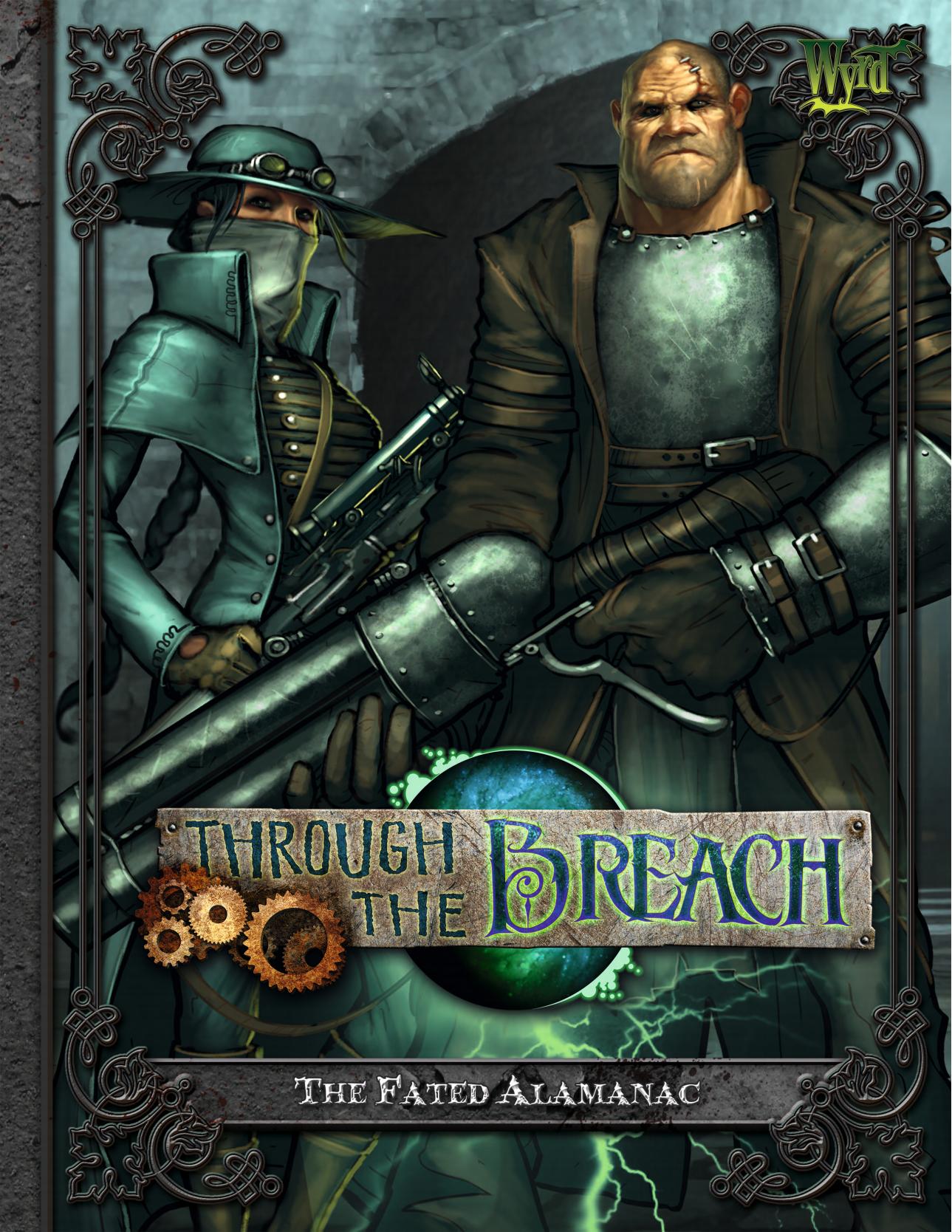
Through the Breach is really traditional in one sense: it needs two books to play. The Fated Almanac is a player's handbook, while the Fatemaster's Almanac is a sort of DM's guide. Beyond that, though, it really doesn't use a lot of traditional RPG stuff. No dice, for one. It likes cards instead. Still uses skill and stat numbers, though. The first part of the book is written in character by a guy called Lucius Crow, a prisoner of some kind. The city of Malifaux scares him, even in a condemned cell, but he loves it all the same. He used to live in Salem, but his family was slain in something called the Salem Vortex, which destroyed all his family ever owned, so he ended up becoming a criminal. By the time he was 20 he was a killer, a thief and a gambler. By 25, he was a known and reliable name in the underworld. He soon began to rub shoulders with the powerful, and that's what led him to Malifaux - he ended up reminding someone of their crimes and needed to be gotten rid of. His boss, Xavier Benjamin, wanted to go legit and that meant getting rid of inconvenient contractors. The only real place to hide was through the Breach, in Malifaux. That turned out poorly for him.
From there, we cut to the main text, which is written as an in-character history by Dr. Emmanuel Harris. He, too, is a condemned prisoner, imprisoned, he claims, for the pursuit of knowledge. He leaves his life's work, this history, as his testament. Long ago, the city of Malifaux and its environs were not ruled by men, who had not yet come to this world. Rather, they were ruled by two races - the greater and the lesser gods. They lived in peace for a time, but the greater gods eventually become tyrants, and the lesser gods warred on their decadent masters. Some say it lasted only a fortnight. Others claim it lasted centuries. Some say even that it was a civil war between greater gods, that the lesser gods were slain only as an afterthought. Whatever the case, it was an unimaginable conflict, an apocalypse of ice and fire and plague. The world itself was torn asunder, and only the city Malifaux remained, an empty and silent monument that would remain untouched for untold centuried.
Man's first interaction with the world of Malifaux came in Earth year 1787. The flow of magic had been dwindling for centuries. The supernatural had become a thing of pure legend, and even the simplest cantrip was far beyond the ability of any but the greatest will-workers. Many scholars doubted magic had ever existed, believing the old tales were nothing but stories. The truth, however, is that magic was very real, but in the modern era it had lost its power. The last mages across the world met together in secret, and with their combined wisdom, they came up with an audacious plan. A great call was sent out across the planet to any and all who had even a shred of magical power. From all corners they came, the Siberian shamans and African witch-women and Parisian dabblers and Asian mystics. They all converged for one final ritual, a desperate gamble to ensure magic was not lost from the world. They say that this ceremony, which opened the Breach, was the greatest working ever done. For a day and a night, the last magic on Earth was poured out into the skies. Some died of the strain, others gave up their lives for just a bit more power. And, at last, they tore open a hole. It would have been small, at first, a mere rip that hung in the air for a few seconds. But it was a success - a short-lived triumph.
Short-lived, that is, because there was a sudden crack and a terrible boom as the sky ripped open in its full and terrible glory. The energies unleashed by this catastrophe were unimaginable. The city surrounding the ritual site on Earthside, whose name is now forbidden, was utterly and instantly destroyed. The shockwave of the Breach's opening wiped out the larger buildings, tumbling them and tearing the smaller ones out by their foundations, flinging them about like toys. But this was not enough. The aetheric surge of the Breach tore through the people of the city, ripping their life force away in a single instant. In a single moment, the entire city was reduced to madness, ruin and corpses. It was the greatest loss there has ever been in so short a time. And yet it was not silent, for the area about the Breach was full of terrible screams of pain and mourning. Some survived, their eardrums ruptured, their eyes bleeding, their limbs ruined, their minds shredded. Those lucky few who survived with mind and body intact, however, found themselves commanding magical power and skill exponentially increased from where they had been moments before. Feats that would have taken an ancient archmagus were at their fingertips. They had become the most powerful magi and shamans the world ever seen, though the price was steep indeed.
The new great powers of the age did not know or trust each other - most of their allies lay dead, and they were not well acquainted. The ritual had not gone according to plan. Magic had not flooded through the Earth - rather, they had torn open a gate to another plane. They had not saved mankind, but helped to slaughter many. They were quick to blame each other, but if anyone had planned this, they did not come forward. It was possible that whoever twisted the rite lay among the dead. Even probable. History does not record the name of the first explorer who tested the Breach, but what they found beyond was a city - a city of silent ruins, stinking of death and magic. Chaos soon followed.
Once the Breach was proven safe to enter, the survivors were quick to do so. Curosity has always been the arcanist's friend. It began innocently, exploring the remains and discovering ancient tomes and artifacts wherever they turned. Who began to fight is no longer recorded, nor why the fighting began, but it was not even a full day before war raged on the streets of Malifaux. The magicians warred with each other, hurling great power against one another in their desperation. Many of those that survived died in the battles that lasted a full fortnight. The willworkers that lived began to band together into opposing cabals, though a handful, some say, fled back to Earth or into the wilderness Breachside, enver to be seen again. When the clash finally ended, one faction ruled, killing or subjugating their foes with ancient oaths. A coundil was formed, treaties signed, and the old city had her new master.
In all that feuding, not a single sign of life was found in the city, save for that which came with them. The Council soon chartered an army of mercenaries to defend the barrier against outsiders, and a small group of explorers was tasked to investigate the city and its surroundings, while scholars by the dozens were found to try and uncover its riddles and secrets. Unsurprisingly, they favored great secrecy in their actions, given their nature. Some say they spread stories of plague and quarantine around the Earthside Breach. Others say they performed a great ritual to cloud men's minds so they might not find the area. Reliable information on the abilities of these wizards is hard to come by. The first great greakthrough was the discovery of a great repository of ancient books, named Duer's Library for its discoverer. Scholars spent months poring over them to try to learn more. At the same time, the Council began to catalogue the city and its surroundings. They could sense great aetheric power, but not how to tap it, and the initial reserves of magic were now beginning to dwindle. They set themselves to solidifying the Breach, which was beginning to quiver erratically after each use, and some believe it was dangerously unstable - too much passage too quickly might seal it or rupture it further.
In the sky, the explorers found twin moons and strange stars. In the city, they found a strange hodgepodge of architecture, as if every civilization on Earth had come together to build a patchwork city. Gothic arches, great minarets and spires, rough brick chimneys and marble pillars, styles from all across the world. Beneath the city they found a network of sewers, caverns and catacombs, ancient crypts full of unimaginable treasure and labyrinths so twisty that all who went in were forever lost. And beyond the walls, the strange wilderness. To the north and south, miles of lighting-blasted wasteland, endless red dirt soon named the Badlands. To the east and west, swamps full of all manner of beast, soon called the Bayou. And in the farthest reaches, immense, snow-capped mountains.
After months, ot was Dr. Arthur Duer himself, with the aid of the Voynich Institute's Professor Mandragone, that cracked the code of the ancient language. The lesser volumes, anyway - it would be years before the higher forms of the native tongue were translated. But with this research, they found the ancient name of the city: Malifaux, she was called. Many of the buildings were labeled by signs, like an Earth hamlet. Fishmongers, blacksmithes, tailors and so on - but stranger things, too. Mechanical Magics, the signs advertised, Aether Vaults, Death Surgeons and Memory Weavers, right alongside the bakeries and butchers.
In the meantime, the Council believed it had found the solution to the Breach. Months of physical nad magical toil were put into the construction of a great stone plinth and arch, carved with mystic runes, surrounding the rift. The portal, at last, was stabilized, and named the Breach of the Great Boundary. The explorers began to filter back into the city, some bringing great riches, others tales of terror, and some never returning at all. But the greatest discovery was a deserted town in the Badlands, a set of crumbling shanties around an old hole. The hole was a mine, full of precious stones. Not just diamonds or opals - something far more precious, far more terrible than anyone could have imagined. Their first proof of this came when they loaded up on stones and one, looking for more, died in a cave-in. The stones the others held began to glow and sparkle, then fall dormant again. As the jewels were studied, it was found that the power they held was finite - their aetheric energy, once used, would leave, and the gems would grow dark. But if someone near the stone were to die, the stone would brighten again, its energy refilled. So the stones were named: Soulstone.
It touched off a great argument. The stones were the power source the Council had wanted, and ancient references to them were found in the texts, warning of danger and power. But none listened to the warnings. Plans were drawn up for fullscale excavation of the gems, that magic could be shared with the world...under Council control, of course. It was six months after the Breach opened that the Council decided to share their plans with the rest of Earth. A grand pronouncement was made, declaring that a new source of near-limitless energy was found to propel humanity into a golden age, built on magic. A call went out for men and women to travel through the Breach, to secure soulstone for the good of all. And so Malifaux was revealed to all of Earth.
From 1788 to 1795, the world reeled with shock. Debates and arguments flared in newspapers and pamphlets, praising or decrying the new events. Diplomats and envoys gathered at the Breach to investigate, to see the wonders of Malifaux, and one clear petition was given to them: send us your citizens and we will share with you the secret of Soulstone. Malifaux became a thriving metropolis, as people came in the thousands. The Badlands settlements became proper boomtowns. Soulstone mining was backbreaking, and not all stones were created equal. The smaller ones were useless in magic, and were ground up to fuel machines or alchemy or medicine. Larger stones were rare, but they could perform miracles in the right hands. Scholars of all kinds poured in, discovering a new science built around aetheric energy and soulstones. They delved into the great secrets of soulstone usage, translating more of the ancient texts. It didn't ake long for distinct schools and models to be formed.
One of the greatest discoveries was the activation of the first Construct. There had been many debris that resembled inert machines. When fitted with a soulstone and tinkered with, it was found that they were, in fact, mechanical devices. Many of these machina were simple, tiny servitors or mechanical replicas of animals. A few, though, were clockwork titans of immense destructive power. Construct creation and maintenance was at best an inexact science, and many accidents caused by haywire weaponry were recorded. The Council, for their part, began inviting artists and politicians, planning to turn Malifaux into the finest city in the world. Agents were sent to discover more secrets of soulstone, and to secure control over the city against rivals. Malifaux became a city of politics, patronage and lies.
Next time: The rise of monsters and the fall of Malifaux.
Post 2
Original SA post Through the Breach: The Fated AlmanacPeople continued to spread across the land around Malifaux proper, and as they did, they began to report strange creatures and monsters. At first, these reports were laughed off as tall tales, the corpses of the dead that were found out there attributed to normal fauna. The people of Malifaux referred to these strange creatures of the tales as Neverborn and laughed at those who thought they'd seen them. All that changed in one night. A caravan heading out to an outlying town, a hundred people who thought they had all they needed, were set upon by flying, horned creatures. They kidnapped or killed anyone they caught. It was the largest attack to that point, and there were too many survivors to ignore. And if that was not enough, a new threat emerged from beneath the city. There had always been a necropolis below, home to many, many graves, and rumors began to circulate of forbidden knowledge hidden among the dead. A few went looking for it.
No one knows what, exactly, happened in those ancient tombs. Some say that corpse-guardians rose and slew all but one of the explorers. Horribly scarred both in mind and body, he escaped back to the undercity with a single book which held a secret to a sort of life after death. This man, the first Resurrectionist, raised himself an army of the dead. They attacked the Council fortifications en masse, trying to tear the city apart, and it almost seemed they'd succeed. The entire city came together in the defense. The Council used ancient magic, the mercenaries manned the walls, but what truly turned the tide were the unexpected heroes of the city. The miners and musketmen who fought side by side with wizards and automata. When things like their worst, a hero would always emerge to help fend off the unliving creatures. Some even say that the natives of Malifaux took part in the war, of a dark lady scything through corpse-soldiers with glee. It was a hard-fought battle, but when the dust settled, the nameless necromancer lay dead. A pity that his secrets didn't die with him.
From then on, Malifaux went through an age of danger and adventure. Tales are still dold of the dark mistress Astarte, of the Quebecois madman Jean-Philip Archambault and his Legion de Mortes Vivantes. All sorts of evil came forth to threaten the city. Yet others were larger than life but to no known purpose - Kenshiro the Weeping Blade, the Clockwork Queen, the Masked Rider. And there were heroes, too, who saved people. Jack o' the Axe, Lady Zorra, the Devilish McGuinne. They fought for justice, for glory and to help others. It seemed like an age that could last forever. However, in the winter of 1797, ten years after the Breach, there was a blizzard like none had ever been before. At its height, it was so terrible that the Breach itself began to tremble. The stone arch keeping it secure started to quake, and witnesses Earthside that day claim to have heard the sounds of battle, at first indistinct, from the other side of the rift. The Breach began to shrink on itself, and the path to Malifaux was totally cut off. No one could pass through the Breach at all, by any means. The wizards on Earth tried to stabilize it, but it couldn't be odne.
As the rift weakened, the masonry collapsed in on itself, and the sound of explosions and shouting could be heard from the inaccessible other side. Just before dawn, they fell utterly silent, and the fissure was barely big enough to fit a man, had any been able to pass through it. Dozens of soulstones were wasted trying to keep the rift open, but at last, just before the end, a single body was hurled through the rift. On its torso was carved a single word: "Ours." The Breach lay still, and then closed entirely. Malifaux was gone.
The fall of the Great Boundary shocked the world. One moment, Malifaux was a miracle of magic and power. The next, it was gone as if it had never been. Many had settled Malifaux in that decade, and no part of Earth had not lost a son or daughter. Memorials sprouted overnight. The papers were garish and sensational, and rumors of conspiracy were everywhere. Many refused to believe the Breach had truly closed, that it was all a ruse to drive up soulstone prices. Others feared the closers of the Breach would come for Earth next, and apocalyptic fervor gripped many religions. The source of soulstone had vanished, and it had driven ever advance of the last decade. People began to horde their supplies, trying to figure out how to deal with this calamity. Others, though, saw it as an opportunity.
Soulstone stockpiles began immediately, and all non-essential uses were cut off, including many public works and medicinal uses. After that, lines had been drawn that few anted to cross. A war for soulstone would engulf the world. It appeared like treaties and diplomacy might win out, but as time passed, the talks began to stall. Troops began to mass. In a few weeks, the Black Powder Wars began, engulfing Europa and, shortly after, the world. Unlike any other war in memory, this one used magic. Sorcerers fought arcane duels on the battlefield, and a few Constructs were used by those that had them, few as they were. And some others, censured after the war, employed necromantic soldiers. The largest battlegrounds were Europa and North America, but smaller conflicts raged in Afrique, other parts of America and Oceania as well. The Gallic Legions faced the King's Empire, the Muscovites fought the Prussians, and in the end, even the Three Kingdoms broke its truces and went to wear in Eastern Europa and Western North America. The Ottoman Sultans, the Amerindians and the Hessians all fought as mercenaries in the war, and soulstone was the spoils - freshly powered by the constant death of the wars. When the dust settled, many national boundaries altered slightly, but there was only one clear victor.
Today, they are known only as the Guild. They'd prefer their history be forgotten. There's evidence that the Powder Wars were not truly about national sovereignty or security - that there was a secret war going on at the same time. A handful of magical societies had not participated in the opening of the Breach, and others were rendered too weak to join in the taking of Malifaux. After the Breach fell and the other mages had been decimated, these syndicates went back to gathering power with a will unlike any other. The most important generals and politicians of the Black Powder Wars owed true allegiance to these secret societies, who were trying to control magic and soulstone for their own purposes. It was not one conspiracy, but many, and their members could be found on all continents, in all societies. It is unclear which one of them grew to become the Guild, but at the end of the war, it was these mages, merchants, politicians and generals that had de factor control over all remaining soulstone.
The wars ended by 1815, and the Guild became ubiquitous over the next eighty years. Their rise was unprecedents, like nothing before it, due to their monopoly on soulstone. They formed their headquarters at the former site of the Breach and from it manipulated the world. Laws were passed forbidding use of any soulstone not authorized by the Guild. Any violators were put to death, often to become soulstone themselves. Many countries adopted official Guild liaisons, and entire cadres to police soulstone usage. The head of a Guild operation in a nation often receives a legitimate title now, lording themselves over all. And a darker function of the Guild? Keeping the soulstone powered, secretly funding prisons, hospitals, asylums, orphanages and old folks' homes to profit from the deaths that occur there. However, there is one thing the Guild could never do, no matter how much power they exhausted trying: they could not open the Breach.
in 1897, one century to the day after the Breach closed - some say to the minute - it suddenly and inexplicably reopened. The Guild quickly took advantage, having planned what it would do if it ever happened. Armed forces across the world were recalled to guard the Breach. And through it all, the Guild panicked quietly, preparing for an invasion to pass through the Breach to Earth. They were certain that the calamity of a century before was to be replayed but with Earthside victims. When a full month passed without incident, a heavily armed expeditionary force was allowed through the rift. The city beyond was found empty, as dead as it was when the first people set foot there a hundred and ten years before, save for recent signs of battle. Some of those signs were fresh, as though the century-old war had just ended. However, there were no corpses. Not even one.
The Guild moved quickly to secure Malifaux, and the announcement of its rediscovery was met with joy and fear. It was, again, a place of opportunity and terrible danger. The Guild was eager to get its first new source of soulstone in a century, of course. A bargain was struck with the great powers. The Guild filled itself with criminals and outcasts, now that Malifaux was no longer a threat on everyone's minds. And new life came to the city. The Guild cordoned off much of the place, dividing into zones of varying protection. The Guild Enclave, now known as Downtown, was the most fortified, wealthiest and safest. After that, the first Slums sprang up, full of worker tenements and homes for servantry, as well as the poor souls headed to work the mines. Things in those early days were bad for the early miners, with dangers of the work claiming up to a full third of all of them. Any area not part of these designated zones was forbidden by guild decree. There was the threat of native predation, and the Guild swore anyone who went in or out without authorization would be shot on sight - a standing order to this day. Still, some wishing to work in secret, without Guild scrutiny, set up their labs and enclaves in these Quarantine Zones.
As time passed, the Guild expanded the habitable part of the city. Smaller corporations and concerns came to make a name for themselves, building homes and offices in parts of the city, often using poor quality knotwood from the native trees to build homes and businesses that, to this day, resemble a frontier town more than a city. This part of the city became the New Construction Zone. The Guild, for its part, divided off an area for manufacturing, factories and partners like the Geissel Metalworks. This became the Industrial Zone. The city grew and prospered, but not entirely safely. The Neverborn lurked in the night, as did the necromantic Resurrectionists, and the rogue mages known today as Arcanists. The Guild marshalled its resources, setting up three special divisions - the Witch Hunters, who killed any magiuc user without Guild sanction, the Death Marshals, who put to rest the unliving and their Resurrectionist masters, and the Neverborn Hunters, who slew the monsters native to Malifaux.
Of course, there were other troubles. The miners lived in deplorable conditions, dying by the score, and the Governor General sat idly by. The Guild didn't care. Eventually, it proved too much. AFter weeks of rioting and ivolence, the Miners and Steamfitters Union was granted official legitimacy. The toil is still dangerous and difficult, but if the Guild pushes its workers too far now, there will be an organized and bloody uprising of miners and common workers. The city continues to be recolonized and tamed, and today, a full quarter of Malifaux is nominally under Guild control.
The author passed through the breach in summer, a linguist and scholar. He thought nothing of the danger, seeking to be part of the great discovery. The Hollow Marsh Gala was held to celebrate a new pumping station under the direction of wealthy industrialist and President of the Miners and Steamfitters Union, Viktor Ramos. This was supposed to end the flooding issues in the lowland mines. However, an Arcanist saboteur launched rockets at the gala, and only by chance did some guests, including the Governor General and President Ramos, survive. Further, the city was under siege by the mad REsurrectionist bandit called Semaus, who had stolen a massive soulstone from the Malifaux Archives - the gem known as the Gorgon's Tear. He murdered a reporter, then raised her corpse at her funeral. The author, meanwhile, is headed to meet with Professor Heilin, a master archaeologist and historian.
Except Heiling was dead, and the author was taken in by the authorities as part of the investigation for a few days. He was soon let free, to meet with the only survivor of the Professor's last expedition - Philip Tombers, lately of the Malifaux Sanitarium. He was a gibbering mess, saying only one word: Kythera. By the enxt day, Tombers was dead at the hands of an Arcanist assassin. The author decided he wanted no part of all this, but was forced into adventure hwich he cannot speak of. The Governor General's son was murdered by the Guild's Captain of the Guard. Seamus broke into the Guild Morgue and stole his undead bride, the reporter he'd killed before. And, of course, the Guild Aircar system had a three-car collision of zeppelins, destroying the lines for months. Officially, mechanical failure, but rumors of Arcanist sabotage were rampant.
'The city has been suffering since the Event, also called the Fall of the Red Star, when a star formerly believed permanent shrieked across the sky, and the city was engulfed by a wave of purple energy that caused pain, fear and panic, particularly to those with magical skills. A few were driven catatonic or insane by the minute-long Event, the first three great tragedies. Plague swept the city soon after, and great cartfulls of the dead were dumped into a hole in the Quarantine Zone now known as the Plague Pit. Rumors of a flutist leading an army of rats, insects and vagrants became commonplace, and many referred to this as the Piper's Plague. The early winter brought the Great Quake, which tore through the city and left sporadic lava spouts behind, befouling the city's water table and requiring water to now be imported. The Governor General declared Martial Law and forbade travel in or out. This has been in place for a full month so far, and the only shipments allowed are those the Guild deems critical. Rumor has it that the Black Market is making vast sums off this, and both the Union and the people are very upset. This is the state of Malifaux on the eve of the author's execution.
Next time: A tour of Malifaux
Post 3
Original SA post Through the Breach: The Fated AlmanacThe book now continues its in-character narration for a tour of the city of Malifaux, starting with the Breach. The Breach appears to most people as a field of silver-blue light, but not everyone. Some people see it as purple, green or orange. An early scholar says it is "a great baleful red rent, with shimmering tendrils of anergy radiating out of it that seemed to grasp and retreat as if alive," while another said it "appeared to me as a perfect blue circle, shining in its center with a pure white light. If I stared into it for long enough my mind would almost grasp a pattern, an infinitely complex mandala, that I could so very nearly comprehend but that my eyes would reject, they simply refused to see it."
Passing through the Breach, for most people, is just a brief flash, a slight tingle or no sensation at all, but some report visual or auditory hallucination, or a sense that for an instant they are the only one in the train car (because it's a train journey), or stranger things. Rumor has it that sometimes, lightning arcs off people, or they have epileptic fights or spontaneously combust, and once, an entire train of passengers just vanished, leaving the train empty at the station when it arrived. Crossing the boundary between worlds is weird sometimes. Sometimes you can get introuble with the Witch Hunters just for accidentally awakening to magic.
From there, you head through Downtown, the safest and most pleasant part of Malifaux. It has things like the Hanging Tree, a great wrought iron 'tree' where corpses are hung and covered in lye, alongside the body of Jack Daw. Across from it is the Governor General's Mansion. Nearby is the Guild Enclave, housing guild offices and a lot of important civil functions, including the Gaol, Morgue and Duer's Library. You can go visit museums and libraries, fine restaurants and boxing parlors. Downtown has but a single Union Hall for the Miners and Steamfitters Union, and also the Star Theater, an immensely popular and well-decorated opera house and theatre.
It's easy to reac the Slums from there, home to the common people. They are a buffer from Downtown and most of the dangerous of Malifaux - Neverborn and Resurrectionist attacks, mainly. There are Union Halls all over the Slums. The further a part of the Slums is from Guild authority, the fewer services and defenses they have, and sometimes a Slum will be controlled entirely by a gang or despot, which can last for quite a while if the right bribes are paid. How nice and kind or vicious and cruel they are strongly determines the quality of life in those areas. The Neverborn and Resurrectionists attack relatively frequently, especially by night. Sites of interest include the Villa Mondragone, once home to the finest scholars of the first ten years of Malifaux, and home to an alien, strange clocktower that rings without schedule or pattern. The Slums are also home to the Malifaux Sanitarium, a public asylum seperate from the cushier Guild-run one in Downtown. It is a terrifying place of constant noise and chaos, home to many who suffer from Badlands Fever - a disease of the mind that seems at first to cause people to head out to the Badlands and, if they are prevented from doing so, makes them go into a mad rage and fugue, typically shouting about how the desert must be fed. The Slums are also home to the Little Kingdom, a gathering place for Asian immigrants in Malifaux and doing surprisingly well due to the fascination of the upper classes with Eastern healers and art recently.
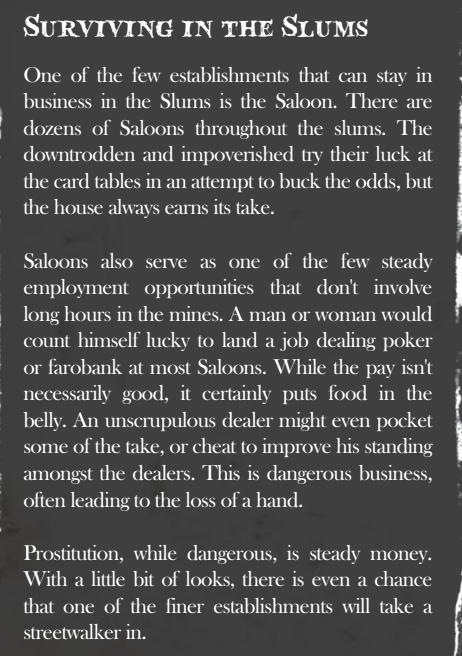
Life is pretty fuckin' shitty for the poor in Malifaux.
The most dangerous parts of the city are the Sewers and Quarantine Zone, but they are also safest from Guild scrutiny. Monsters and criminals prowl these areas, alongside anyone else that would prefer to avoid being seen. Rumor has it the Quarantine Zone is full of Arcaist safehouses and Resurrectionist labs. If you know where to look, you can also find the Arcanist Black Market, which eals in anything the Guild has declare illegal, plus certain artifacts and antiquities available nowhere else. The trouble is getting to it through the Quarantine Zone and then knowing the passwords that'll get you in. You also want to be careful of sewer rats - the rats of Malifaux are the size of small dogs, can clamber across walls or ceilings with relative ease and have no particular fear of man. They're ruthlessly exterminated above ground, when found, but below the streets they are allowed to breeds as they will. The Necropolis remains somewhere below Malifaux still, the wicked place wher ethe first Resurrectionist made his wicked discoveries, and, some say, the home of the largest and most potent soulstone in Malifaux.
Outside the city, there are vast stretches of empty wilderness, dotted by the Contract Towns where soulstone is mined. At least, the most prosperous ones have mines. The rest are out there for travelers and usually have desperate opes for railways to be built nearby, bringing in vast sums and protection from the Guild. If the soulstone ever runs dry, the towns risk becoming ghost towns, as everyone vacates for better places. A rare few homesteaders make their lives out in the Badlands, trying to raise a living on cattle - something that may, in a generation or two, lead to money, but right now is a meager existence. Rumor has it that of late the cattle or blighted and will go violently berserk without warning. The most famous settlement is Latigo, the ranch-fortress of a family of Neverborn Hunters, the Ortegas, which is under near-constant siege by the Neverborn. The seem to be okay with that.
The mines and the Hollow Marsh Station are the most important sites to the guild. Hollow Marsh Pumping Station was set up to drain forty square kilometers of previously unmineable land and eliminate flood hazards in six other mining sites. It's an immense set of steam engines that pump water out of distant mines into a vast lagoon. The Station is also the headquarters of the Miners and Steamfitters Union, and is slowly growing into a whole town in its own right. Past the lands it's reclaimed is the Deep Bayou, silent but for insects and trees. Through its center runs the River, three feet of crystal clear water surrounded by an inky blackness. Near the city, the River is used to ferry people back and forth from Bayou settlements nad mines, as well as for fishing and trading runs with the Gremlin villages downriver. The further down you go, the closer you come to Gremlin lands - foul, squat creatures of green skin that live in holves along the river. The closest ones ape human behavior, but further afield they are often vicious cannibals. The nearer ones like to play banjo, and drums are a constant in Gremlin territory. And, last, deep in the Bayou, is the Hag's Hut. The Hag has lived there as long as anyone knows, perhaps even predating the breach. It's said that if you find her and beat her in a game of chance, she'll give you anything - but if you lose, she'll eat your soul. None have seen or heard from her in months, and no one knows why.
Far out in the desert, in the Far Badlands, lightning will strike without warning and dust storms rise in minutes. The danger is not obvious here - it's a desert, unpredictable, and most who enter it die. Everything there looks alike, with no landmarks or routes. You could try to navigate by the sun or moon, but it's said they do not follow the same unerring paths as they would Earthside. The only landmark is the Bedlam Quarry, an immense rock bowl with two huge, rusted obelisks in the center. No one knows what it was foor. To the north are the Foothills, much easier to navigate and full of soulstone, but dangerously close to the Northern Peaks There, the snow never stops, and the howling ice will kill most visitors. Somewhere in there is the lair of the Winter Witch, the Cannibal-Queen of the Wendigo, who can call down blizzards and is a vicious murderer of travelers.
Throughout the wilderness are half-buried ruins of the original peoples of Malifaux, and greatest among them is the Temple of Kythera. They say you can reach it by traveling east on the River for a month and a day, until the sky turns green and the sun black, and the moons wink out. If you steer towards the invisible moons, and pass the riddle of the Guardian-Serpent that rises from the secret lake, you will be shown the gate to Kythera, the temple and holy darkness, the doorway to death. It is unclear what exists at Kythera or its potential sister sit, Nythera, but the author knows that's where Heilin lost his life and Tombers lost his mind.
From there, we get a discussion of the people of Malifaux. Some are wealthy men or the children of wealthy families, come to make or grow a fortune. These are the free men and women, who have no Guild contract and need none. Others have signed contracts to serve the Guild, often with lucrative rewards - many of the Guild Guard, some doctors, lawyers or scholars. They're treated well, but are bound by contract for two to four years. The Sepecialist Contract can do much of what they like, so long as they obey their Guild duties. Those who come in poverty and want to claw their way are the indentured servants, signging the Indenture Contract. Most of the miners and rail workers are on that, hoping to buy their freedom but taking years to pay off their Guild debts. The worst are the Convict Contracts - those who are sentenced to labor in the mines of Malifaux to avoid prison or the noose. It means Earth doesn't have to pay to feed them, and the Guild rewards them handsomely for the slave labor. Such contracts can last years, or even a whole lifetime. These are little more than slaves. What contract you have determines your social standing, from the moment you board the train to Malifaux. The Blue Cars of the wealthy, with no contract needed, are very nice. The Regular Passenger cars carry most of Guild Contract or Indenture Contract, and in the back, the Chain Cars bring the criminals, shckaled and bound.
The Guild and it's Ram's Head sigil are all over Malifaux. They issue the Guild scrip that is the currency of the city, and they want you believe they are everywhere and inescapable. They are not, however, omniscient or omnipotent. They are monolithic, yes, but they are still an organization of men and women. They employ an army of bureaucrats to track contracts, deeds and claims. Learning to navigate the bureaucracy is a valuable skill in the city, as Guild paperwork can bring Guild power. Within the adminstrators is the secretive Elite Division, led by the Governor's Secretary, Lucius Matheson. They are in charge of law, the judges and lawyers of the Guild. Some say they truly control the city via the Governor General, and by tradition they wear ornate masks at all times. The Guild Guard are who you most often see - the police and law enforcers, who guard the checkpoints, do the patrols, investigate petty crime and so on. They are well-paid soldiers with a lot of leeway when off-duty...though if you prove incompetent or piss someone off, you get sent on Sewer Patrol or Qurantine Dockmast duty - dangerous work at best.The top rank of the Guard get badges and are armed with Guild Peacebringers - pistols mounted with razor-sharp blades, needing extreme training to use effectively but very dangerous. Anyone without authorization who uses one is shot on sight.
There are three Special Divisions as well. First is the Witch Hunter Task Force, charged with hunting down rogue Arcanists. They were once led by the famous Sonnia Criid, but she has disappeared, leaving them led now by Samael Hopkins. Their great weapons are the Witchling Stalkers, hunched, burnt creatures wielding broken swords which, it is said, can sense and neutralize magic use. Some say they are what remains of those Arcanists the Guild arrests. The Witch Hunters are the least popular Special Division, and they do a lot of damage to the Guild's public image - after all, it's a widely held belief in the Guild that anyone could be an Arcanist, so all are under suspicion.
Second are the Death Marshals, led by blind Lady Justice and her companion, the Judge. They wield enchanted coffins, light as air in their hands but as heavy as the iron and oak boxes they're made from to everyone else. They often use these to smash through doors or walls, and once shut, no power on Earth of Malifaux can open them save for the Death Marshal's own will, letting them be used to trap even the mightiest unliving.
Last are the NEverborn Hunters, who have no strict hierarchy. The Guild is so desperate that just about anyone can sign up to be one, and will be paid a hefty bounty if they succeed, but few survive the job long. The most famous exception is the infamous Ortega family of Latigo, who have taken the fight to the Neverborn. Their most famous member is the legendary gunwoman Perdita rtega, the best Neverborn Hunter of the age. There are said to be other Special Division charters, like the Flesh-Construct Frafting Illegality Task Force, led by the Construct-master Hoffman. That crime doesn't come up often at all.
Next time: People that aren't the Guild
Post 4
Original SA post Through the Breach: The Fated AlmanacThe Miners and Steamfitters Union was originally part of the Malifaux Railworkers Union, but grew to a larger concern in its own right. They are now the main advocate for worker's rights, and they're based mostly out of the Union Halls that are found throighout the Slum neighborhoods. These are meeting spaces, dance halls, family gathering places and more, and it is from these halls that the leadership of the Union is democratically elected. The current President is Doctor Viktor Ramos, inventor and industrialist, who lives atop the Hollow Marsh Pumping Station. He is reputedly harsh but fair and tirelessly champions the rights of the working class. The current Vice President, Duncan McSweeny, unfortunately died rather recently.
The final thing that the Miners and Steamfitters Union does is work protests. Most of their demonstrations and strikes are nonviolent, but many also erupt into violence after the Guild provokes or attacks them, or they are pushed to it by Guild plants or saboteurs within the Union itself. The miners are fearsome foes if provoked - not as well-trained or well-equipped as the Guild Guard, but there's a hell of a lot more miners.
The city is also full of mercenaries. Tradition holds that if you are traveling with a mercenary you don't polan to fight, you offer them the Clover's Pact: 'My purpose shall not injure your own.' Politically, it's getting pretty tought for mercenaries these days. After years of tolerance, the Guild is started to be bothered by so many armed people not under their control. Some say it's because the creatures they were hired to kill and the distracts they've been hired to clear are now firmly under Guild law. Others say it's that the mercenaries' true loyalty is wealth, and recently the Guild isn't always the top bid. Whatever the reason, the Guild is becoming hostile to mercenaries. The most contentious relationship is with Von Schill of the Freikorps.
Rumor has it that the Freikorps, the top mercenary band, have been rooting around the Quarantine Zone quite illegally, but the Guild would have a very hard time enforcing their will. The Freikorpsmenn are excessively well-trained and equipped, and they are each highly specialized fighters, to say nothing of Von Schill's legendary tactical skill. It's also said that the Freikorps are currently on a recruiting drive, but no one knows why.
The Arcanists are a foe of the Guild ever since the reopening the Breach, when the unauthorized use of magic was banned. For years, the Witch Hunter Task Force has been seeking out these magic users, so now only the sneakiest, cleverest and most ruthless survive. They have been driven together by desperation, forging a network of mutual protection and recruitment. This became the group known as the Arcanists, who now believe they can strike back at their persecutors. They formed a clandestine military organization devoted to bringing down the Guild no matter what the cost. However, they have not been and are not morally pure themselves - they are not above killing the innocent if it means harming the Guild in some way, and the Guild strikes back just as indiscriminately. Civilians get caught in the crossfire every time.
The Resurrectionists are the most terrifying human foe, though. They are necromancers, harnessing the power of death to raise armies of zombies. It's said that their art is taught to them by some dark patron, that there is a unified theory of undeath and that all currently practicing necromance are but imperfectly understanding it. The mechanics of raising a corpse are rather like alchemy - you find the corpse, you use a special necrotic ichor, it gets up. The formula varies from person to person. One Resurrectionist might have faster slaves, but another might have better motor control. Either way, the main problem is corpses. You need a lot of bodies to run Resurrectionist experiments towards the perfect necrotic serum.
The Neverborn, aslo known as the Manifestata, are the native creatures of Malifaux, though some say only sentient creatures can be called Neverborn. Most common are the horned, black-blooded Nephilim, whom many believe to be the direct descendants of the ancient people of Malifaux. It is believed that their violent, antisocial and tribal nature is a madness caused by racial memory of the apocalypse which wiped out their civilization. Another type of Neverborn, spoken of only in whisper, is the Doppelganger - a type of spy that can take on the shape of any man or woman, with a great talent for mimicry. They say that Doppelgangers have infiltrated even the upper echelons of the Guild. You never know who is truly a Doppelganger. There are also among their number many creatures born apparently of nightmare - tentacled monsters, creatures of writing flesh, living puppets or deadly toys. The author ends with a warning of mad dreams and fate, and one final piece of advice: never go to the Red Horseshoe Saloon, because they water down their drinks and have terrible food.
Now we hate mechanics. the book starts with character generation after an explanation of stats. You start with four Physical Aspects and four Mental Aspects, whose value can be between (usually) -6 and 6, with 0 being average for a human. -3 is the lowest possible starting score for a PC, and 3 is generally the highest point a starting PC can hit, but they can later improve from there. -3 is 'somewhat below average,' for the record - no PC is ever completely terrible at something, just bad.
The Physical Aspects are:
-
Might: Raw strength and physical prowess.
-
Grace: Accuracy and fluidity of motion.
-
Speed: Swiftness and, uh, speed.
- Resilience: Resistance to damage and disease.
The Mental Aspects are:
-
Charm: Likability and apparent trustworthiness.
-
Cunning: Shrewdness and quick thinking.
-
Intellect: Logical thought and book learning.
- Tenacity: Willpower and confidence.
There are also a number of skills, which range from 0 ('unskilled') to 5 ('master'), which you add to an Aspect when determining a total. Each Skill is tied to a specific Aspect. You also get Talents - unique abilities or modifiers. We'll look at Skills and Talents later, because I think the best way to present that is via character generation, which is random but in a way that's pretty balanced: you create a character with a Cross Roads Tarot spread. (Albeit one using the Malifaux suits - Rams for Hearts, Crows for Spades, Tomes for Clubs and Masks for Diamonds.
So, give me some characters to build here. You've read about the world - tell me what kind of things you want to see!
Next time: Characters.
Post 5
Original SA post Through the Breach: The Fated AlmanacOkay. We have our union organizer and secret wizard, a resurrectionist miner and a mercenary Freikorpsmann - probably someone in a company associated with them, as the full Freikorps themselves are top fuckin' tier and an advanced thing. We start with the Station, drawing the central card of the Cross Roads. This will determine the character's parentage and the final line of their Fate.
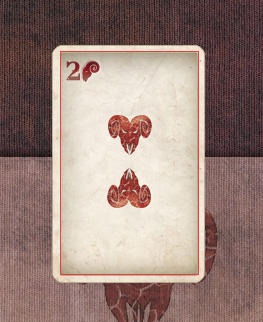
For our Union man, that's the Two of Rams. Station: Indentured Servant. So his parents are basically slaves, and we grew up in a servant's household.
quote:
It is an unfortunate parent who must decide between debtor's prison and indentured servitude. Working off a deep debt, however, keeps them close to their family and out of irons.
The Station skill for this is Pneumatic. We note this for later and see our current Fate:
quote:
...and you will forget yourself.
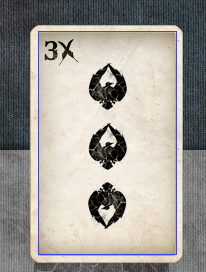
Our Resurrectionist-to-be has the Three of Crows - Dabbler. Her parents dabbled in magical arts somehow and got into some shady shit as a result.
quote:
Your family secretly dablled in the magical arts, trading dusty tomes with dangerous people. The search for esoteric power, however, was often its own reward.
The Station skill is Prestidigitation, noted for later. Our current Fate:
quote:
...and you will be maimed.
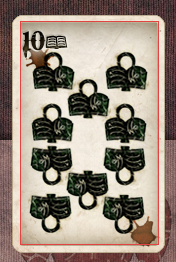
Our mercenary gets the Ten of Tomes - Madame. Her parents ran a bordello.
quote:
Every urban center is home to a brothel or ten. Your guardian was in charge of one of these houses, and you spent your youth surrounded by the wealthy and their concubines.
The Station skill is Intimidate. Our current Fate:
quote:
...and he is to you as the hermit is to the forest.
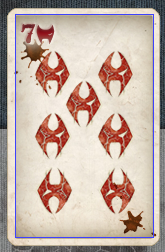
Our drunk gets the 7 of Masks - Hawker. Some kind of street salespeople.
quote:
While general stores carry merchandise tailored to everyday life, a hawker provides immediate convenience and inexpensive (if shady) goods. These traveling peddlers might be perfectly fair merchants, but many work with street urchins to turn an even greater profit.
The Station skill is Appraise. Our current Fate:
quote:
...and you will unshackle the prisoner.
So, we're starting to see some shape here. Next, we deal a card to the left of the Station, the Western or Body card. This determines the character's physical aspects. It gives us four values we can assign as we like.
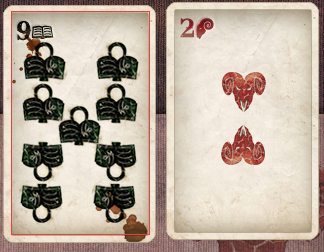
For the Union man, our card is the 9 of Tomes - -1/-1/0/+2. So he's not so great at two things, average at one and pretty good at another. We know his parents were servants, and that he ended up a gregarious Union guy. I think that he spent a lot of time indoors, watching people, so he's not so tough or strong, but he's picked up some real physical grace. Might -1, Grace 2, Speed 0, Resilience -1. Our Fate is now:
quote:
The reflection in the water shows the truth
and you will forget yourself.
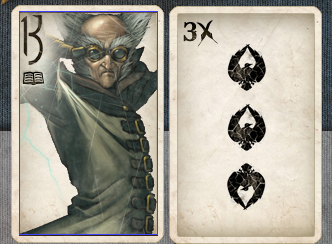
Our Resurrectionist draws the 13 of Tomes - that's a King. -1/-1/-1/+3. So really good at one thing, but not so hot at anything else. She was raised by mystical dilettantes or dabblers, so I think that she ended up fairly tough, having to be around all that incense and smoke, but she never really exercised anything much. Might -1, Grace -1, Speed -1, Resilience 3. Our Fate is now:
quote:
Worlds of marble turn flesh again
and you will be maimed.
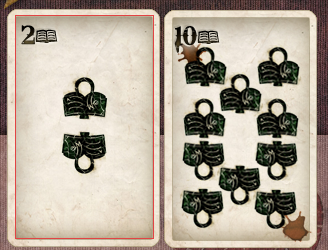
Our mercenary draws the 2 of Tomes. -3/0/+1/+2. So she's decent at two things, but terrible at a third. She grew up around the wealthy and prostitutes. I think she ended up strong and graceful, but not very fast - she was never allowed to run around, for fear of disturbing someone. Might 2, Grace 1, Speed -3, Resilience 0. Our Fate is now:
quote:
The end will find him in the garden
and he is to you as the hermit is to the forest.
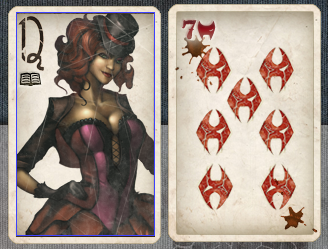
Our drunk draws the 12 of Tomes. Lots of Tomes today! This is -2/-1/0/3. Really good at one thing, but pretty bad at two others. Growing up around traveling merchants, I think he got fast and quick, but he got sick pretty often and was never a graceful kid. Might 0, Grace -2, Speed 3, Resilience -1. Our Fate:
quote:
Lunatics fear where you will stalk
and you will unshackle the prisoner.
From here, we move to the Northern position, for the Root Skills. This represents the skills learned early in life.
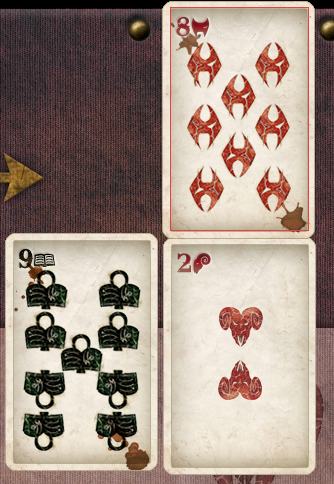
The Union guy gets the Eight of Masks. This gives 3, 2, 2, 2. We can't assign any of them to the same skill. We turn to our skill list. The skill types are Academics, Close Combat, Crafting, Expertise, Magical, Ranged Combat, Social and Training. Academic Skills are: Art (Cunning), Bureaucracy (Cunning), Engineering (Intellect), Mathematics (Intellect), History (Intellect) and Literacy (Cunning). Close Combat skills are Flexible (Grace), Heavy Melee (Might), Martial Arts (Speed), Melee (Might), Pneumatic (Might) and Pugilism (Might). Crafting is Alchemistry (Intellect), Artefacting (Cunning), Blacksmithing (Intellect), Farming (Tenacity), Homestedaing (Tenacity), Printing (Intellect) and Stitching (Cunning). Expertise is Appraise (Cunning), Doctor (Intellect), Explosives (Intellect), Forgery (cunning), Gambling (Cunning), Husbandry (Charm), Lockpicking (Grace), Music (Charm), Navigation (Tenacity), Pick Pocket (Speed), Scrutiny (Cunning), Track (Cunning) and Wilderness (Cunning). Magical is Counter-Spelling (Tenacity), Enchanting (Charm or Cunning), Harness Soulstone (Charm), Necromancy (Charm or Tenacity), Sorcery (Intellect or Tenacity) and Prestidigitation (Cunning or Intellect). Ranged Combat is Archery (Grace), Heavy Guns (Might), Long Arms (Intellect), Pistol (Grace), Shotgun (Grace) and Thrown Weapons (Grace). Social is Barter (Tenacity), Bewitch (Charm), Convince (Intellect), Deceive (Intellect), Intimidate (Tenacity), Leadership (Charm) and Teach (Intellect). Training is Acrobatics (Grace), Athletics (Might), Carouse (Resilience), Centering (Tenacity), Evade (Speed), Labor (Resilience), Notice (Cunning), Stealth (Cunning) and Toughness (Resilience).
So, we have a 3, and three 2s to assign to four skills. Any skills we like. We grew up among servants, and we know this guy is pretty sneaky. I'd say he gets Deceive 3, thanks to lying to the people his parents served, Labor 2, for doing manual labor, Notice 2, for picking up on small details, and Evade 2, for getting the hell out of the way when the son of the family that his parents worked for was around and felt like bullying him. Our Fate is now:
quote:
...for the silence brings inspiration at the door.
The reflection in the water shows the truth
and you will forget yourself.
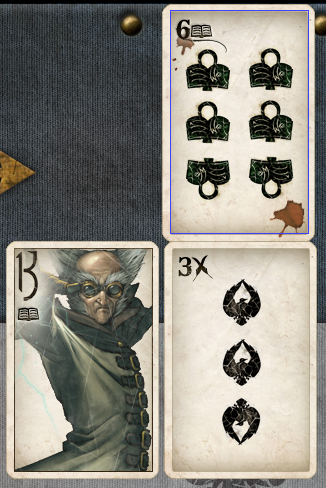
The 6 of Tomes offers 3,2,2,1,1. Now, we know that magic was an obsessional hobby for our resurrectionist's parents. So, we'll say that she picked up Necromancy 3 - it's a family trade. She dabbled in a lot, though, getting Counter-Spelling 2 and Scrutiny 2, to better deal with magic and watch for tricky people. She learned some History 1 from how she grew up, and picked up on some Music 1, too. Well-rounded education, you know. Fate:
quote:
...as the jester dances where he will.
Worlds of marble turn flesh again
and you will be maimed.
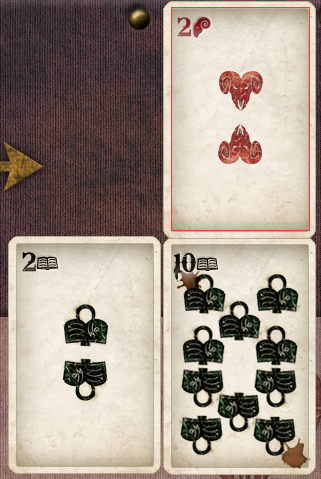
Our mercenary draws the 2 of Rams. 3,2,1,1,1,1. I'll say she picked up Gambling 3 from playing around with clients and Bewitch 2 from watching the girls. She then got a hodgepodge of other skills from her upbringing - Scrutiny 1, Athletics 1, Carouse 1 and Pugilism 1. She grew up among nobles, but also criminals, and she learned to watch people and make friends, leg it when it got too rough and fight when she couldn't run. Fate:
quote:
...for the gloom will deny that it knows you.
The end will find him in the garden
and he is to you as the hermit is to the forest.
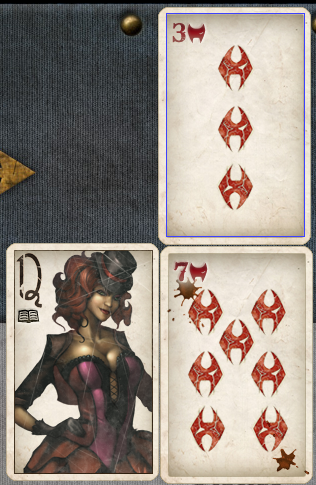
Our drunk draws the 3 of Masks. 3,2,1,1,1,1. We take Pick Pocket 3 - he was set by his parents to steal for a living. He also gets Carouse 2, for the fun he had around town, Barter 1 for watching his parents, Intimidate 1 for scaring the local kids, Evade 1 for dodging trouble and Pugilism 1 for starting it. Fate:
quote:
...as the living wither from your grasp.
Lunatics fear where you will stalk
and you will unshackle the prisoner.
Next time: More chargen.
Post 6
Original SA post Through the Breach: The Fated AlmanacWe left off on the Eastern card, the Mind. Mental stats are developed as the character matures, learning critical life skills. This is all about experience as an adolescent, really.
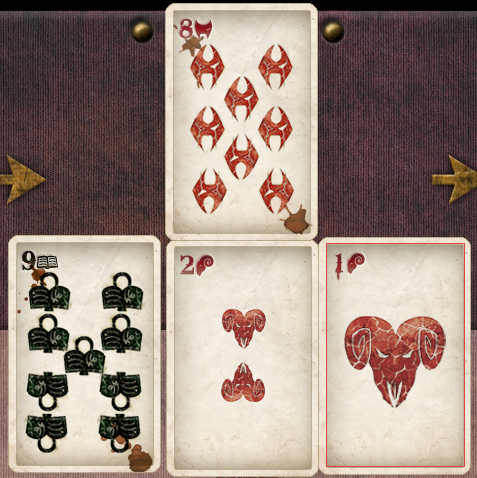
For our Union man, that's the One of Rams. -3/0/0/+3. He's really good ato ne thing and really bad at another. We know he's a wizard, but his cover seems more important here, too. We'll give him Charm 0, Cunning 0, Intellect 3, Tenacity -3. He's very smart and articulate, if not super charming, but he's lacking in willpower. Fate:
quote:
...you will make dust of the ram's horns
for the silence brings inspiration at the door.
The reflection in the water shows the truth
and you will forget yourself.
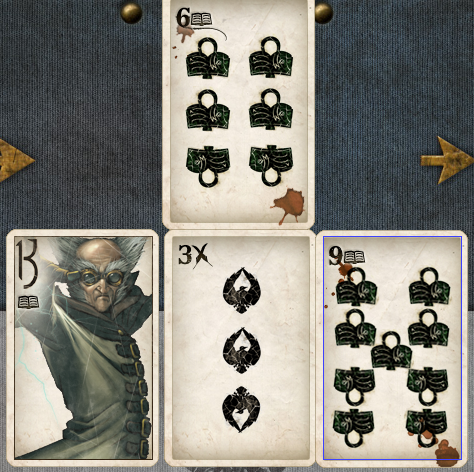
The 9 of Tomes for our Resurrectionist. She gets -1/-1/0/+2. We'll go with Charm 2, Cunning -1, Intellect -1, Tenacity 0. She gets by on charm and wit rather than book learning or manipulation, but she's only a little below average at those. Fate:
quote:
...the gloom will know you as a brother
as the jester dances where he will.
Worlds of marble turn flesh again
and you will be maimed.
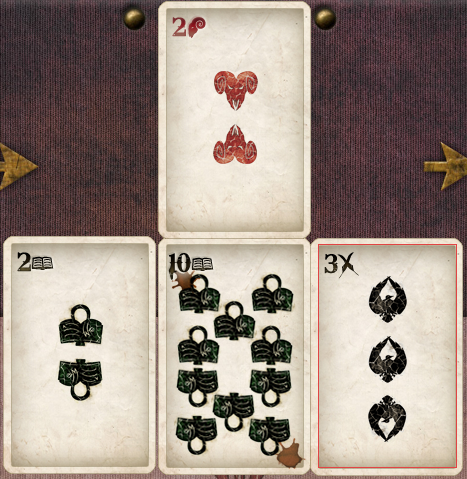
The mercenary draws the 3 of Crows. -2/-1/+1/+2. She seems more cunning than charming or smart. We'll go with Charm -1, Cunning 2, Intellect -2, Tenacity 1.
quote:
...you will be reborn of flesh and redemption
for the gloom will deny that it knows you.
The end will find him in the garden
and he is to you as the hermit is to the forest.
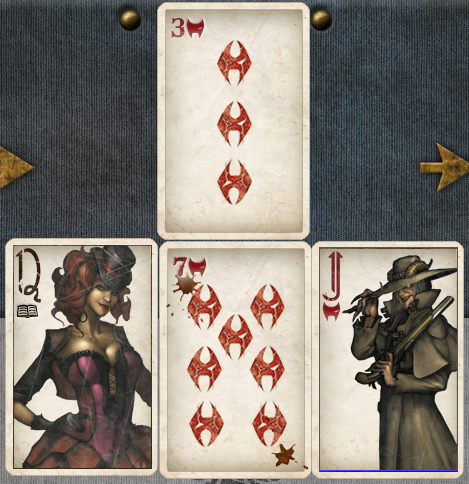
Our drunk draws the 11 of Masks. -2/-1/0/3. Again, cunning seems to fit best. Charm -2, Cunning 3, Intellect -1, Tenacity 0.
[quite]...your ruination will hound your desperate exodus
as the living wither from your grasp.
Lunatics fear where you will stalk
and you will unshackle the prisoner.[/quote]
This brings us to the final card, the Southern or Endeavor skill card. This gives you the skills that the character chose in maturity. Again, the points can be assigned to any skills you want, but not added to any skill already having points. After that we go back and check our Station skills. If the character didn't end up with it, they get it at 1, otherwise they get 1 XP.
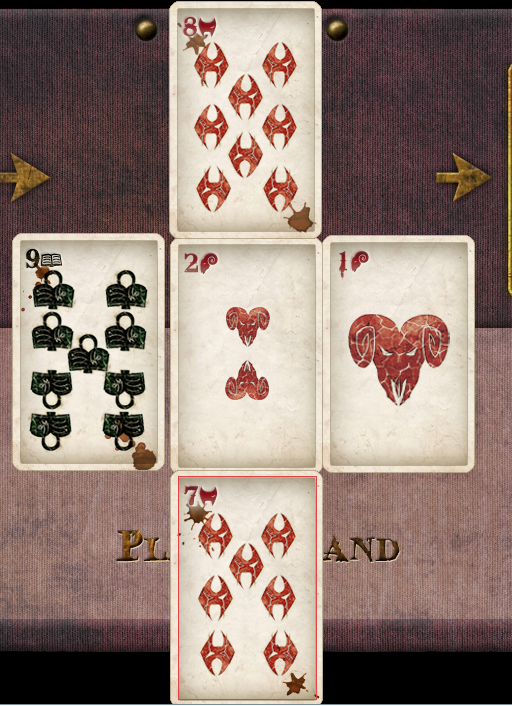
Our Union man's final card is the 7 of Masks. 3,2,2,2. We assign the 3 to Sorcery and a 2 to Enchantment, then another 2 to Leadership, and a final 2 in Convince. His Fate is now complete. Station skill was Pneumatic.
quote:
Deceive (Intellect) 3, Sorcery (Intellect or Tenacity) 3, Enchantment (Charm or Cunning) 2, Leadership (Charm) 2, Convince (Intellect) 2, Labor (Resilience) 2, Notice (Cunning) 2, Evade (Speed) 2, Pneumatic (Might) 1pre:
Might -1 Charm 0 Grace 2 Cunning 0 Speed 0 Intellect 3 Resilience -1 Tenacity -3
After the reaper has come for innocence
you will make dust of the ram's horns
for the silence brings inspiration at the door.
The reflection in the water shows the truth
and you will forget yourself.
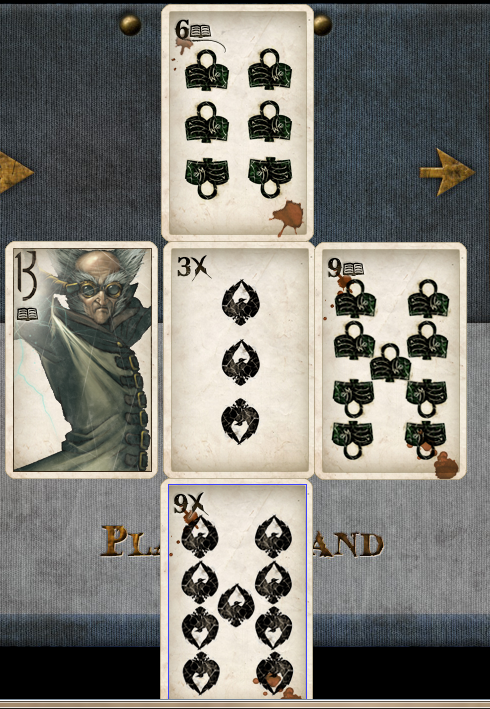
The REsurrectionist draws the 9 of Crows. 3,2,2,2. We'll go for Engineering 3, Enchantment 2, Stitching 2 and Bewitch 2. Station skill was Prestidigitation.
quote:
Necromancy (Charm or Tenacity) 3, Engineering (Intellect) 3, Enchantment (Charm or Cunning) 2, Stitching (Cunning) 2, Bewitch (Charm) 2, Counter-Spelling (Tenacity) 2, Scrutiny (Cunning) 2, History (Intellect) 1, Music (Charm) 1, Prestidigitation (Cunning or Intellect) 1pre:
Might -1 Charm 2 Grace -1 Cunning -1 Speed -1 Intellect -1 Resilience 3 Tenacity 0
As the hunter watches you swallow the maggots
the gloom will know you as a brother
as the jester dances where he will.
Worlds of marble turn flesh again
and you will be maimed.
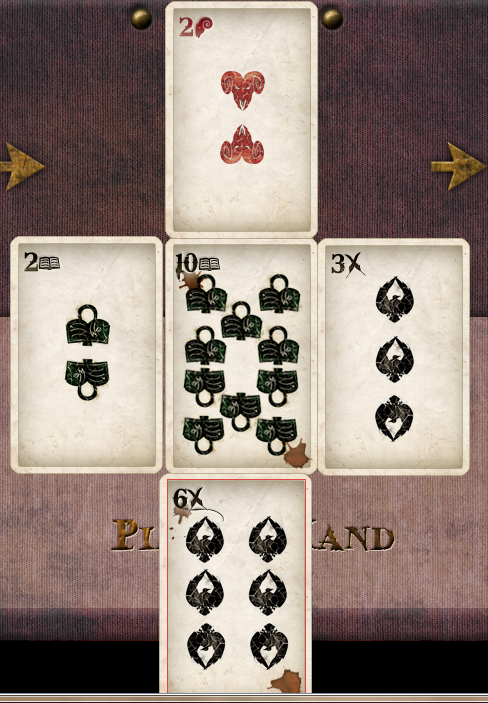
Our merc draws the 6 of Crows. 3,2,2,1,1. We'll go with Pistol 3, Melee 2, Evade 2, Toughness 1, Track 1. Station skill was Intimidate.
quote:
Gambling (Cunning) 3, Pistol (Grace) 3, Melee (Might) 2, Bewitch (Charm) 2, Evade (Speed) 2, Scrutiny (Cunning) 1, Athletics (Might) 1, Carouse (Resilience) 1, Pugilism (Might) 1, Toughness (Resilience) 1, Track (Cunning) 1, Intimidate (Tenacity) 1pre:
Might 2 Charm -1 Grace 1 Cunning 2 Speed -3 Intellect -2 Resilience 0 Tenacity 1
Once your stains have been bound within
you will be reborn of flesh and redemption
for the gloom will deny that it knows you.
The end will find him in the garden
and he is to you as the hermit is to the forest.
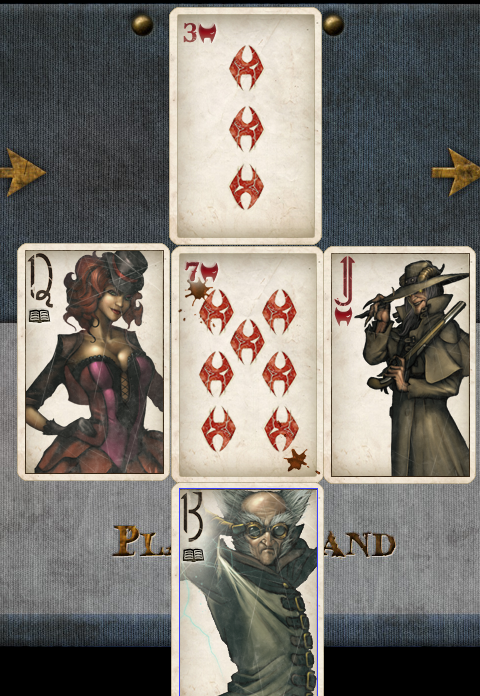
Our drunk draws the 13 of Tomes. 3,3,2. We'll want Toughness 3, Artefacting 3 and Pneumatic 2, I think. Station skill was Appraise.
quote:
Pick Pocket (Speed) 3, Toughness (Resilience) 3, Artefacting (Cunning) 3, Pneumatic (Might) 2, Carouse (Resilience) 2, Barter (Tenacity) 1, Evade (Speed) 1, Pugilism (Might) 1, Appraise (Cunning) 1pre:
Might 0 Charm -2 Grace -2 Cunning 3 Speed 3 Intellect -1 Resilience -1 Tenacity 0
As you walk the lonely road
your ruination will hound your desperate exodus
as the living wither from your grasp.
Lunatics fear where you will stalk
and you will unshackle the prisoner.
After this, you get 2 points to spend to boost aspects. These can be spent as you like on any aspects, and can be spent on the same one. However, they can't raise a stat over 3. We'll boost our Union man to Charm 1 and Might 0. Our Resurrectionist will take Charm 3 and Intellect 0. Our merc will take Might 3, Grace 2. Our drunk will take Tenacity 1, Resilience 0.
Next time: Pursuits and Fate.
Post 7
Original SA post Through the Breach: The Fated AlmanacWhen we left off, we had to look at our Fates and Pursuits. The Fate, that poem we've assembled, comes into play later - during the game. Basically, the GM is going to make sure that circumstances arise to fulfill the Fate somehow, though I imagine in practice that generally means interpreting events such that they seem to fit because of how maddeningly opaque this shit can be. As Fate is fulfilled, you get special bonuses which we'll discuss later. So, instead, Pursuit. Pursuit is kind of like character class - it's your rough archetype and it gives you access to one or more Talents, one of which you will lose access to if you change your Pursuit - see, you can change your Pursuit before any session. The one you start out with, however, also determines your starting equipment. At character generation you can only take a Novice Pursuit - one that has no prerequisites. The book doesn't have any of the other kind - the Advanced Pursuits, which you need to meet the requirements of before you can take them. There's a few in the Fatemaster's Almanac.
The available Novice Pursuits are: The Academic, a loremaster. The Criminal, a thief and procurer. The Dabbler, a beginning mystic. The Drudge, a laborer who often has a steam-powered limb. The Graverobber, someone seeking necromantic power. The Guard, a defensive specialist. The Gunfighter, a master of pistols and shotguns. The Mercenary, a master of rifles and long arms. The Overseer, a support specialist and foreman. The Performer, a musician and master of misdirection. The Pioneer, a survivor and wilderness specialist. The Scrapper, an unarmed and melee fighter. The Tinkerer, a master of machinery. And the Wastrel, a gambler and disguise artist.
For our Union man, this is a tough choice. We could go with Dabbler or Tinkerer - both are magic-using Pursuits. I think, ultimately, we want the Tinkerer - the guy is part of the Union, after all, and the Tinkerer also specializes in Enchanting and Sorcery. The Tinkerer also begins the game with 1 Enchanting Magia, 1 Sorcery Magia and 3 Immuto. What are those? Well, I'll explain in a bit, they're kind of the back of the book, but for our purposes: Magia is a spell, Immuto is a spell modifier. The Tinkerer must also choose a Magical Theory talent. Lastly, they get the Gear Head Talent as their Pursuit Talent: Whenever they fail a Magic duel (read: an action that requires flipping a card to see how well you do), they can draw a card from their Twist Deck. We'll get into what that is in just a moment. Also, at the end of a session they may choose to advance a Magical skill rather than any options presented by the GM. For our Magical Theory, we could go with the Darlin Theories and rely on having a special pneumatic device to do magic, but this guy's not really an artificer. Instead, I think we'll go with Tradition Magic - he was brought into a family tradition, and gets a bonus to using Sorcery, but can never learn Necromancy well. We grab Elemental Projectile and Heal as his Magia, so he can shoot people and heal people, and Electric, Darkness and Increased Damage as his Immuto - basically, he can shoot lightning or darkness blasts, and he can make the spell harder to increase his damage.
quote:
Pursuit: Tinkerer
Deceive (Intellect) 3, Sorcery (Intellect or Tenacity) 3, Enchantment (Charm or Cunning) 2, Leadership (Charm) 2, Convince (Intellect) 2, Labor (Resilience) 2, Notice (Cunning) 2, Evade (Speed) 2, Pneumatic (Might) 1pre:
Might 0 Charm 1 Grace 2 Cunning 0 Speed 0 Intellect 3 Resilience -1 Tenacity -3
Talents: Gear Head, Tradition Magic (Sorcery)
Magia: Elemental Projectile (Sorcery, Intellect), Heal (Enchanting, Cunning)
Immuto: Electric, Darkness, Increased Damage
Gear: Grimoire
After the reaper has come for innocence
you will make dust of the ram's horns
for the silence brings inspiration at the door.
The reflection in the water shows the truth
and you will forget yourself.
Our necromancer lady obviously selects Graverobber as her Pursuit. She gets Black Soul, which has the same effects as Gear Head, and she starts with a Grimoire containing a Necromancy MAgi, an Enchanting Magia and 3 Immuto, plus a Magical Theory talent herself. For her Magic Theory, we could take the Whisper, which gives a bonus to necromancy and magic on undead, but gives a penalty to Intellect duels, so that might not be our best choice, since we have a bunch of Intellect-based skills. Instead, we go for The Court Procedure, which makes it harder for us to cast spells resisted by Defense, but easier to cast spells resisted by Willpower. We grab Physical Enhancement and Raise Undead as our magia, and Focus Object, Increase AP and Increased Duration as our Immuto. We'll get to what that all means...eventually. Organization!
quote:
Pursuit: Graverobber
Necromancy (Charm or Tenacity) 3, Engineering (Intellect) 3, Labor (Resilience) 2, Stitching (Cunning) 2, Bewitch (Charm) 2, Counter-Spelling (Tenacity) 2, Scrutiny (Cunning) 2, History (Intellect) 1, Music (Charm) 1, Prestidigitation (Cunning or Intellect) 1pre:
Might -1 Charm 3 Grace -1 Cunning -1 Speed -1 Intellect 0 Resilience 3 Tenacity 0
Talents: Black Soul, Court Procedure
Magia: Physical Enhancement (Charm, Enchanting), Raise Undead (Charm, Necromancy)
Immuto: Focus Object, Increase AP, Increased Duration
As the hunter watches you swallow the maggots
the gloom will know you as a brother
as the jester dances where he will.
Worlds of marble turn flesh again
and you will be maimed.
For our mercenary, Mercenary is actually a poor choice - it's for rifles, not pistols. So we take Gunfighter instead. She gets Finger on the Trigger - when she fails a Ranged Combat duel, she can draw a card, and she can advance a Ranged Combat skill instead of anything the GM offers at the end of session. She starts the game with one pistol or shotgun worth up to 20 scrip, with one free customization. We'll take the Collier Single Action Army revolver, which gives a bonus to intimidation as well as being a hefty gun, and we'll apply a free Custom Grip so that it gets a bonus on attack.
quote:
Pursuit: Gunfighter
Gambling (Cunning) 3, Pistol (Grace) 3, Melee (Might) 2, Bewitch (Charm) 2, Evade (Speed) 2, Scrutiny (Cunning) 1, Athletics (Might) 1, Carouse (Resilience) 1, Pugilism (Might) 1, Toughness (Resilience) 1, Track (Cunning) 1, Intimidate (Tenacity) 1pre:
Might 3 Charm -1 Grace 2 Cunning 2 Speed -3 Intellect -2 Resilience 0 Tenacity 1
Talents: Finger on the Trigger
Gear: Collier Single Action Army (Custom Grip)
Once your stains have been bound within
you will be reborn of flesh and redemption
for the gloom will deny that it knows you.
The end will find him in the garden
and he is to you as the hermit is to the forest.
Our drunk seems to be a perfect Wastrel. That gives him the Educated talent, which lets him draw on failed Expertise duels and advane an Expertise skill after sessions instead of the GM's granted options. He also begins the game with a free non-magical skill toolkit. This gives tools suitable to perform any tool-required skills of a certain type, plus a bonus to one skill of that type. Ultimately, I think we want Crafting (Artefacting).
quote:
Pursuit: Wastrel
Pick Pocket (Speed) 3, Toughness (Resilience) 3, Artefacting (Cunning) 3, Pneumatic (Might) 2, Carouse (Resilience) 2, Barter (Tenacity) 1, Evade (Speed) 1, Pugilism (Might) 1, Appraise (Cunning) 1pre:
Might 0 Charm -2 Grace -2 Cunning 3 Speed 3 Intellect -1 Resilience 0 Tenacity 1
Talents: Educated
Gear: Crafting (Artefacting) toolkit
As you walk the lonely road
your ruination will hound your desperate exodus
as the living wither from your grasp.
Lunatics fear where you will stalk
and you will unshackle the prisoner.
After this, we calculate derived aspects. Defense (Df) is 2 plus the higher of Evade and Speed. Willpower (Wp) is 2 plus the higher of Centering and Tenacity. Wounds is 4 + Toughness, plus half Resilience (rounding up) if Resilience is positive. It's HP. Walk is how far you can go in yards in a Walk action - 4 plus half your Speed, rounding in whatever way is better for the character. Charge is how far you can move in a charge. 4 plus your Speed, or your Walk if Charge would be slower. Height is how big you are - humans are Height 2. And you get the Living and Fated aspects - primarily, this is about keywords and unlocking Talents. Some Talents are Fated-only, so only PCs get them. You then get to choose one General Talent. I'll go over the whole list later, but for our purposes I'll pick some out and explain what they do. Characters also get 10 Guild Scrip to spend on equipment, plus 5 free reloads for any gun they happen town and an assumed wardrobe of whatever suits the character. If you own more than one gun, you get 5 free reloads, total, to split between your guns.
quote:
Pursuit: Tinkerer
[ore]Might 0 Charm 1
Grace 2 Cunning 0
Speed 0 Intellect 3
Resilience -1 Tenacity -3[/pre]
Deceive (Intellect) 3, Sorcery (Intellect or Tenacity) 3, Enchantment (Charm or Cunning) 2, Leadership (Charm) 2, Convince (Intellect) 2, Labor (Resilience) 2, Notice (Cunning) 2, Evade (Speed) 2, Pneumatic (Might) 1
Talents: Gear Head, Tradition Magic (Sorcery), Specialized Skill (Sorcery, Tomes)
Magia: Elemental Projectile (Sorcery, Intellect), Heal (Enchanting, Cunning)
Immuto: Electric, Darkness, Increased Damage
Gear: Grimoire, 10 Scrip
After the reaper has come for innocence
you will make dust of the ram's horns
for the silence brings inspiration at the door.
The reflection in the water shows the truth
and you will forget yourself.
Specialized Skill means that any Sorcery action that our union guy takes automatically has the Tomes suit in addition to whatever is drawn - important, because our Sorcery spell requires Tomes to function properly. This means he can pretty reliably shoot people with magic and not worry about the fact that he owns no weapons.
quote:
Pursuit: Graverobber
Necromancy (Charm or Tenacity) 3, Engineering (Intellect) 3, Labor (Resilience) 2, Stitching (Cunning) 2, Bewitch (Charm) 2, Counter-Spelling (Tenacity) 2, Scrutiny (Cunning) 2, History (Intellect) 1, Music (Charm) 1, Prestidigitation (Cunning or Intellect) 1pre:
Might -1 Charm 3 Grace -1 Cunning -1 Speed -1 Intellect 0 Resilience 3 Tenacity 0
Talents: Black Soul, Court Procedure, Unassuming
Gear: Grimoire, Staff
Magia: Physical Enhancement (Charm, Enchanting), Raise Undead (Charm, Necromancy)
Immuto: Focus Object, Increase AP, Increased Duration
As the hunter watches you swallow the maggots
the gloom will know you as a brother
as the jester dances where he will.
Worlds of marble turn flesh again
and you will be maimed.
We pick up a custom staff - a nice stunning weapon, but more importantly a good focus object for our spellcasting. We also grab Unassuming, which requires us to have Might -1 or lower and gives us a bonus to any Duel to avoid notice in a group or avoid angering someone.
quote:
Pursuit: Gunfighter
Gambling (Cunning) 3, Pistol (Grace) 3, Melee (Might) 2, Bewitch (Charm) 2, Evade (Speed) 2, Scrutiny (Cunning) 1, Athletics (Might) 1, Carouse (Resilience) 1, Pugilism (Might) 1, Toughness (Resilience) 1, Track (Cunning) 1, Intimidate (Tenacity) 1pre:
Might 3 Charm -1 Grace 2 Cunning 2 Speed -3 Intellect -2 Resilience 0 Tenacity 1
Talents: Finger on the Trigger, Just A Graze
Gear: Collier Single Action Army (Custom Grip), cavalry saber, 50 revolver bullets
Once your stains have been bound within
you will be reborn of flesh and redemption
for the gloom will deny that it knows you.
The end will find him in the garden
and he is to you as the hermit is to the forest.
For our mercenary, I grab Just A Graze - this lets her cheat damage she takes lower, as long as the damage doesn't have a bonus. (Cheating will be explained later.) We also pick up a sword for her and 20 extra bullets.
quote:
Pursuit: Wastrel
Pick Pocket (Speed) 3, Toughness (Resilience) 3, Artefacting (Cunning) 3, Pneumatic (Might) 2, Carouse (Resilience) 2, Barter (Tenacity) 1, Evade (Speed) 1, Pugilism (Might) 1, Appraise (Cunning) 1pre:
Might 0 Charm -2 Grace -2 Cunning 3 Speed 3 Intellect -1 Resilience 0 Tenacity 1
Talents: Educated, Scoundrel
Gear: Crafting (Artefacting) toolkit, knuckleduster, Yamisaka Type 30, 25 rifle bullets, 1 scrip
As you walk the lonely road
your ruination will hound your desperate exodus
as the living wither from your grasp.
Lunatics fear where you will stalk
and you will unshackle the prisoner.
Our drunk picks up Scoundrel - whenever he makes a Social Action and draws a Masks card, he can make a free Pick Pocket action with a bonus. He also buys a Yamisaka Type 30 rifle for self defense if his fists and the knuckledust he buys aren't enough.
After this, each has only one thing to do: build a Twist Deck. Your Twist deck is 13 cards, normally numbered 1 to 13, barring any Talents that alter it. Rams are the suit of physical power, damage and willpower. Crows are the suit of entropy, armor, wounds and undeath. Masks are the suit of madness, deception, speed and Defense. Tomes are the suit of magic, constructs and elemental power. You choose one of these Suits to be your Defining Suit, adding the 1, 5, 9 and 13 of that suit to your Twist deck. You choose another suit as your Ascendant Suit, adding the 4, 8 and 12. You pick a third for your Center suit, adding 3, 7 and 11. And the last suit is Descendent and you add 2, 6 and 10. The Twist deck is used for cheating flips in play, which we'll get into, uh...soon.
Next time: An overview of the Pursuits first, though.
Post 8
Original SA post Through the Breach: The Fated AlmanacEvery Pursuit has its Pursuit Talent. When you change Pursuits between sessions, you lose that talent and gain the one from your new Pursuit. They all function the same way - when you fail a certain type of skill check, you can draw a card from your Twist Deck, and at the end of the session you can advance that type of skill instead of whatever the GM offers you. Every adventure you use a Pursuit for, you gain one of its advancement Talents as well. Each has ten, and they're always gained in order. No matter what Pursuit you are in, you have access to all advancement talents you've unlocked. You only get the starting gear of the Pursuit you exited chargen as, however - when you take on a new Pursuit, you don't magically acquire it. (With one exception: the GM is instructed that anyone who wants to get a magical Pursuit in play should be able to find a Grimoire somewhere, if not one stocked with as much as the starting gear ones.) So, what are the Pursuits?
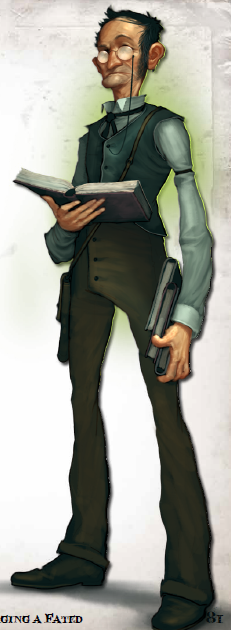
The Academic is a scholar and scientist, pursuing knowledge. They may often lack in martial skill, but they excel at seeking information and exploring the sciences. Besides, they don't all suck at fighting - the dashing professor in the long duster with the pistol is jsut as much an Academic as the stuffy scientist in the lab coat. Academics tend to be well-acquainted with Malifaux culture and history, helping to navigate ruins and understand items of power. Their Pursuit Talent is Avid Student , which does its thing on Academic skills and tests. Their starter gear is a non-magical skill toolkit.
As they advance, they gain:
-
[1. Student of Knowledge: When you draw a Tomes card on Academics duels, after the result is resolved, draw a card.
2. A General Talent, like the one gotten during chargen.
3. Eureka Moment: When you draw a Tomes card on Academics duels, gain 2 additional Margins of Success. OR Rational Mind: When you would make a flip to resist an act of manipulation, such as terror, mind control or intimidation, you may use Cunning or Intellect instead of the normal resistance Aspect.
4. A General Talent.
5. Eureka Moment OR Great Thinker: Choose one Academics skill. Your maximum skill rating for it is 6, not 5. You can take this multiple times, but for a different skill each time.
6. A General Talent.
7. Eureka Moment OR Applied Learning: Choose an Academics skill and a secondary skill. When you make a skill challenge with the secondary skill, you may use the Academics skill you chose as your Aspect rating instead of the normal Aspect. You can take this multiple times, but for a different combination each time.
8. A General Talent.
9. Applied Learning or Great Thinker
10. Sum of all Knowledge: When you make a Cunning or Intellect-based challenge flip, you may add a bonus equal to half of any one Academics skill, rounding down. The skill used must share the same Aspect being used for the flip.
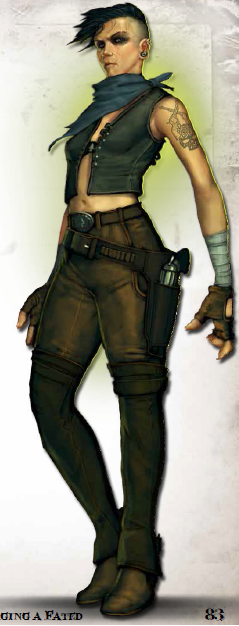
The Criminal is...a criminal. They act outside the law, generally for monetary gain but not always. They have a wide variety of skills and often like to team up with others to make sure that they can cover their weaknesses. They are often skilled at breakins, either subtly or loudly, and acquiring items as long sa you don't care how. Their Pursuit Talent is Opportunist , which works on Expertise skills and tests. Their starter gear is a non-magical skill toolkit.
As they advance, they gain:
-
1. Competitive Edge: When you draw a Masks card on Expertise duels, after the result is resolved, draw a card.
2. A General Talent.
3. Improvise: Choose a skill. You are always considered to have a toolkit for that skill. You may take this multiple times for different skills each time. OR Quick Work: Reduce the action point cost of your first Use Skill action each turn, to a minimum of 0.
4. A General Talent.
5. Improvise OR Nimble: You get an extra Action Point each turn that can only be used for a movement action.
6. A General Talent.
7. Quick Work OR Surprise Assault: When you attack before any other character acts this scene, any and all attacks you make while that's true get a bonus to the Challenge Flip and the Damage Flip. You may take this multiple times, getting an additional bonus each time.
8. A General Talent.
9. Surprise Assault OR Nimble
10. Master of Misdirection: When you succeed on a (1) Trick Challenge, anyone attacking your target gets a bonus instead of just you. Further, you get a bonus to defend against attacks made by people suffering the effects of any Trick - even someone else's.
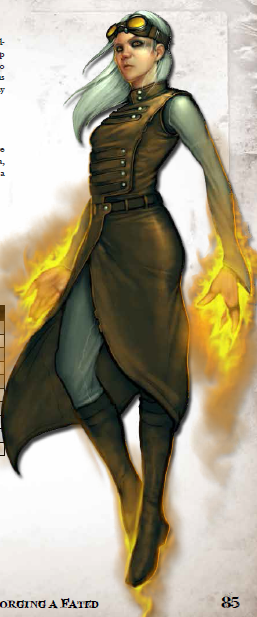
The Dabbler is someone fascinated by magic, who has started to learn how to use it. They specialize in Sorcery and Prestidigitation. They are all criminals under Guild law, and learn to hide their power until they become too hard to arrest or gain some acceptance. Dabblers seek out secrets and forbidden knowledge. Their Pursuit Talent is Epiphany , which works on Magical skills and tests. Their starter gear is a Grimoire containing 1 Sorcery Magia, 1 Prestidigitation Magia and 3 Immuto. Also, they get a Magical Theory talent if they don't already have one.
As they advance, they gain:
-
1. Arcane Musings: Remove a single Tomes requirement from the TN of any spell you cast.
2. A General Talent.
3. Mastered Immuto: Choose an Immuto you have access to via at least one Grimoire. You may use that Immuto with any Grimoire, even if it doesn't contain that Immuto. OR Spell Affinity: Choose a specific Immuto or Magia. All challenge flips to cast or resist spells containing that Immuto or Magia get a bonus. You may take this multiple times, but must choose a different Immuto or Magia each time, and can only benefit from one Spell Affinity for any given flip.
4. A General Talent.
5. Spell Affinity OR Mastered Magia: Choose a Magia in at least one Grimoire you have access to. You may use this Magia with any Grimoire, even if it does not contain the Magia, and may use it even if you do not have access to any Grimoires for some reason.
6. A General Talent.
7. Mastered Immuto OR Mastered Magia
8. A General Talent.
9. Mastered Magia OR Spell Affinity
10. Empowered Channeling: When casting a spell, increase the value of your Focus condition by 1, as long as you have the Focus condition on you already.
Next time: Drudges, Graverobbers and Guards.
Post 9
Original SA post Through the Breach: The Fated Almanac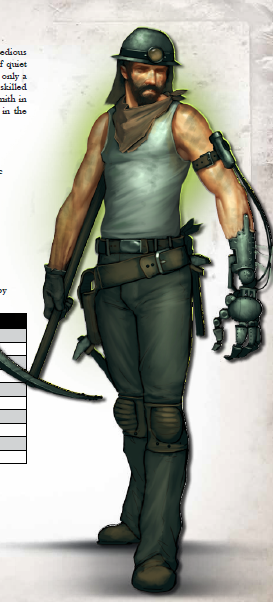
The Drudge does hard labor. Most of them have pneumatic limbs, and as a result most are in debt to the Guild or the Union, and most are Union members. They are folk heros to the lower classes, but mere tools to the rich and powerful. They work in the harshest conditions without tiring, and they are powerful. They are often skilled craftsmen and extremely tough. Their Pursuit Talent is Hard Days Night , which works on Training skills and tests. Their starter gear is a pneumatic limb that, with augments, costs no more than 25 scrip.
As they advance, they gain:
-
1. Long Days: You can discard a Twist card to automatically pass an Unconsciousness Challenge. Also, when you draw a Rams card on any Resilience or Tenacity duel (but not Defense of Willpower), you heal one damage after resolving the duel.
2. A General Talent.
3. Steady Pace: During an Ongoing Challenge, if you succeed on a challenge flip, you get a bonus to the next one. You may take this up to three times, and the effects stack. OR Team Work: When assisting another character or being assisted, you add an additional bonus to the Challenge flip. You may take this up to twice, and its effects stack.
4. A General Talent.
5. Team Work OR Slow To Die: Critical Effect Flips against you get a penalty. You may take this up to three times, and the effects stack.
6. A General Talent.
7. Steady Pace OR Long Suffering: You may use Resilience instead of Tenacity or vice versa to calculate the value for any challenge flip that uses one of the two aspects.
8. A General Talent.
9. Long Suffering OR Slow To Die
10. Can't Keep Me Down: You may discard a card from your hand to ignore the negative effects of all Critical Effects until the end of your turn. This doesn't heal the effects - you just power through it for a while.
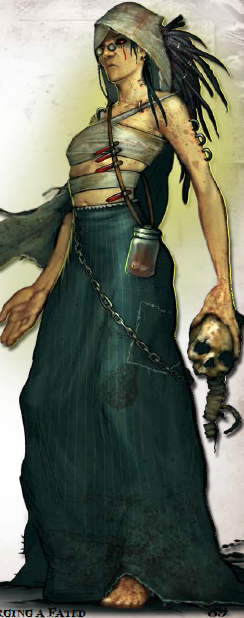
The Graverobber feels the call of necromancy, whispering in their mind. They have been touched by darkness, and their soul has been addicted to creating life. Some embrace it, while others join the Death Marshals, and others still fight the dark urges and keep themselves sane on their own, using their power but not giving into it. Their Pursuit Talent is Black Soul , which works on Magical skills and tests. Their starter equipment is a Grimoire containing 1 Necromantic Magia, 1 Enchanting Magia and 3 Immuto. Also, they get a free Magical Theory talent if they don't already have one.
As they advance, they gain:
-
1. Morbid Thoughts: You may remove a single Crows suit from the TN of any spell you cast.
2. A General Talent.
3. Mastered Immuto OR Deathly Pallor: You get a bonus to any challenge to intimidate or strike fear, including spells.
4. A General Talent.
5. Deathly Pallor OR Mastered Magia
6. A General Talent.
7. Mastered Immuto OR Macabre Infusions: You count as Undead as well as Living if you want to. Generally, free undead will ignore you instead of attacking you.
8. A General Talent.
9. Macabre Infusions OR Mastered Magia
10. Unholy Beacon: You may discard a card to take control of any undead, including natural undead or those controlled by another. Sentient undead may resist, and you must make a Charm+Necromancy challenge flip against their Tenacity+Resilience to dominate them.
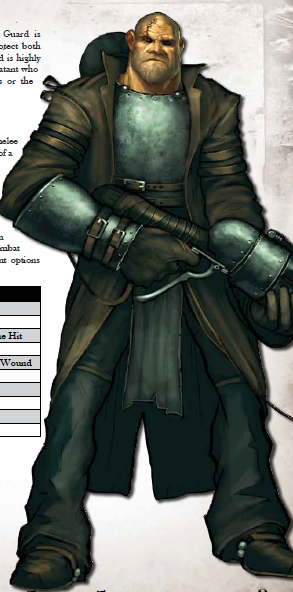
The Guard protects people. Often, they are drawn to protecting the weak from a young age. They never back down, though some are driven by profit as much as justice. The Guild loves to hire these people (and deny them to others), but it also very obviously sees them as expendable. Still, most are happy to be hurt if it saves another. Guards are alert for danger at all times, trained to protect people and property both. Their Pursuit Talent is Now You Are Pissing Me Off , whoch works on Close Combat skills and tests. Their starter equipment is any melee weapon and armor whose combined value is no more than 25 scrip.
As they advance, they gain:
-
1. Stoic Defender: When you draw a Masks card on any Defense duel, reduce any damage you suffer by 1, to a minimum of 1.
2. A General Talent.
3. Inevitable Defense: You don't have to discard a card to enter Defensive Stance. Further, when you are in Defensive Stance, all friendly characters within 2 yards of you get a bonus to Defense challenges. OR Take the Hit: You may discard a card after an attack hits another character within two yards of you, before damage is dealt. You move in front of the target and are hit instead, and the damage flip is at a penalty.
4. A General Talent.
5. Inevitable Defense OR Hard to Wound: All damage flips against you are at a penalty. You may take this up to twice, and the effects stack.
6. A General Talent.
7. Hard to Wound OR Flurry: Choose a Close Combat skill. With that skill, you can take a (2) Flurry action: Discard a card to take three 1-AP strikes with a melee weapon using the chosen skill against a single target. You may take this talent multiple times, for a different skill each time.
8. A General Talent.
9. Flurry OR Take the Hit
10. Unyielding: You reduce the Action Point cost of Defensive Stance actions by 1, to a minimum of 0.
Next time: Gunfighters, Mercenaries, Overseers and Performers.
Post 10
Original SA post Through the Breach: The Fated Almanac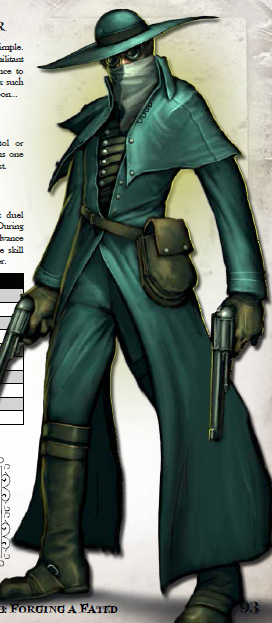
the Gunfighter is more than just a user of guns. Anyone can use a gun. Gunfighters understand the gun, master the craft of gunfighting. Their skill is supreme, and many seek only to test themselves against ever-greater challenges. Most favor the revolver, but they tend to be good with a shotgun, too. Most gunfighters keep a small collection of guns that they feel a real personal attachment to. No matter what, a gunfighter's a violent person, one who knows how to kill. Their Pursuit Talent is Finger On the Trigger , which works with Ranged Combat skills and tests. Their starter equipment is one pistol or shotgun worth up to 20 scrip, and one free customization for it.
As they advance, they gain:
-
1. Quick Draw: On any challenge flip, including initiative flips, if you draw a Rams card you may immediately take a Ready Weapon action after the flip resolves. Further, you treat (1) Ready Weapon actions as if they were (0) Ready Weapon actions.
2. A General Talent.
3. Call Out: You may discard a card to give someone a -3 penalty to any one attack that doesn't target you. OR Gunfighter: Choose a Ranged Combat skill. You may use any weapon that uses that skill as if it were a melee weapon with range of two yards. (Damage remains the same.) You may take this multiple times, choosing a different skill each time.
4. A General Talent.
5. Call Out OR No Time For This: When you are involved in an Ongoing Challenge, you may at any point choose to make a single flip with your Pistols or Shotguns skill instead of the appropriate skill. You and the GM figure out how that works from a story perspective.
6. A General Talent.
7. No Time For This OR Rapid Fire: Choose a Ranged Combat skill. You may make the (2) Rapid Fire action with that skill: discard a card to make three 1-AP attacks with a weapon of the chosen skill against a single target. You may take this multiple times, applied to a different skill each time.
8. A General Talent.
9. Gunfighter OR Rapid Fire
10. Ranged Expert: You get an additional Action Point each turn, usable only to make an attack with a Ranged weapon.
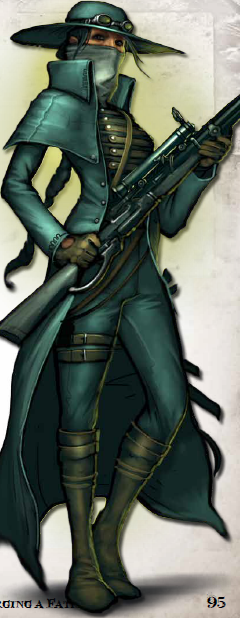
The Mercenary makes money by doing or threatening violence. Most are ex-military, often deserters. The most famous mercenary groups include the Freikorps, the Catalan Corps and Jom's Vikings. The Freikorps, of course, work for Von Schill, a tactical master who is famous for taking on the worst missions and winning. The Catalan Corps are originally Sicilian, but they run on a democratic system, rather like privateers, with votes based on rank. Jom's Vikings are, uh, thugs and bounty hunters under the command of Melvina Broken-Arrow. Bounty hunting isn't all that rare for mercenaries, actually. Their Pursuit Talent is Deadset , which works on Ranged combat skills and tests, and their starter equipment is one carbine or rifle worth up to 20 scrip, with one free customization on it.
As they advance, they gain:
-
1. Speed Loading: Choose a firearms-based Ranged Combat skill. When you make an attack with that skill and draw a Rams card, you may reload it immediately for free if its Reload Action Point cost is 2 or less.
2. A General Talent.
3. Gruesome Attack: Choose a Melee or Ranged skill. All Critical Effect flips you do with that skill get a bonus. You may take this multiple times, for the same or different skills, and the effects stack. OR Tricky Shot: Choose a Ranged skill. When you make an attack Challenge Flip with that skill, you may choose to ignore one penalty.
4. A General Talent.
5. Coin for Kills: You get a bonus to Damage Flips against any target you were paid to fight or kill. GM's discretion what counts - bounties probably do, and anyone you're explicitly hired to harm definitely does.
6. A General Talent.
7. Tricky Shot OR Relentless: You are immune to Horror effects.
8. A General Talent.
9. Relntless OR Gruesome Attack
10. Endless Pursuit: You get a bonus to Defense Flips against anyone you were paid to fight - which includes anyone with a bounty on their head explicitly this time.
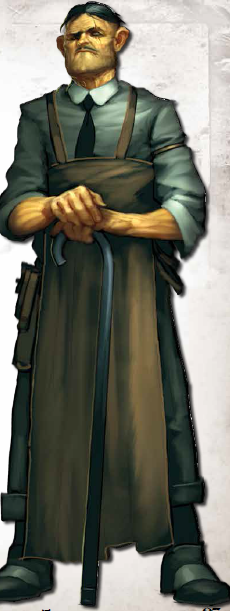
The Overseer is someone who can survive the economic hell that is the Guild’s taxes. They’re entrepreneurs, bosses, the guys who stand in the path of the Guild’s economic machine and protect their employees and their resources. They keep morale up and make sure the work keeps flowing, for good or ill. They can be kind or cruel, but they are definitely masters of logistics and skilled leaders. Their Pursuit Talent is Oversight , which works on Social skills and tests. Their starter gear is a non-magical skill toolkit.
As they advance, they gain:
-
1. Concerted Effort: When friendly characters make Initiative Flips, they can choose not to and instead use yours.
2. A General Talent.
3. Time is Money: Choose a skill. When you succeed on a Challenge Flip on that skill during an Ongoing Challenge, you generate an additional margin of success. OR Work Smarter: You may discard a card to add the suit of that card to the action value of yourself or another friendly character that can see or hear you.
4. A General Talent.
5. Work Smarter OR Delegate: On any Defense duel, if you draw a Tomes card and you would take damage, another friendly character within 3 yards of you becomes the attack’s target instead.
6. A General Talent.
7. Time is Money OR You Lazy So & So: You may discard a card to allow a friendly character who can see or hear you to ignore the effects of all Critical Effects until the end of their turn. They still make any required challenges - they just ignore the effects until the end of their turn. You may take this multiple times, and for each time after the first, the duration is one additional turn.
8. A General Talent.
9. Delegate OR You Lazy So & So
10. Now Men!: You may discard three cards. If you do, all friendly characters that can see or hear you may immediately take a 1-AP action in any order you like.
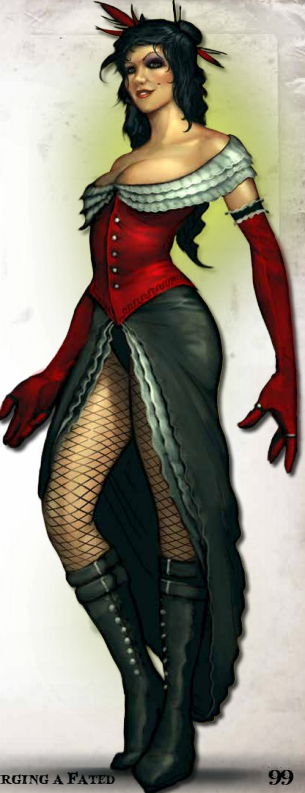
The Performer is an entertainer and an artist - a thriving job in Malifaux, since people need any distraction from the threats and despair around them. Might be an actor, a showgirl or an acrobat. They are charming and friendly, and make friends easily...as well as enemies. They understand the social fabric of Malifaux better than anyone, and are master manipulators. Their Pursuit Talent is Flare for the Dramatic , which works on Social skills and tests. Their starter gear is a non-magical skill toolkit.
As they advance, they gain:
-
1. Powerful Impression: On any Social duel, if you draw a Masks card, draw a card after the duel resolves.
2. A General Talent.
3. Grace Under Fire: You may use Grace instead of Speed to derive Defense and for Initiative. OR Helluva Entrance: You get a bonus to the first Challenge Flip you make in any scene.
4. A General Talent.
5. Grace Under Fire OR Classically Trained: Choose a Social skill. Your maximum for that skill is 6 now instead of 5. You may take this multiple times, for a different skill each time.
6. A General Talent.
7. Helluva Entrance OR Graceful Exit: You may discard a card to impose two penalties on any non-Area attack that targets you directly until the end of your next turn.
8. A General Talent.
9. Classically Trained OR Graceful Exit
10. That’s Showbiz: You may exchange Charm for any other Aspect when making a Social Challenge.
Next time: Pioneers, Scrappers, Tinkerers and Wastrels.
Post 11
Original SA post Through the Breach: The Fated Almanac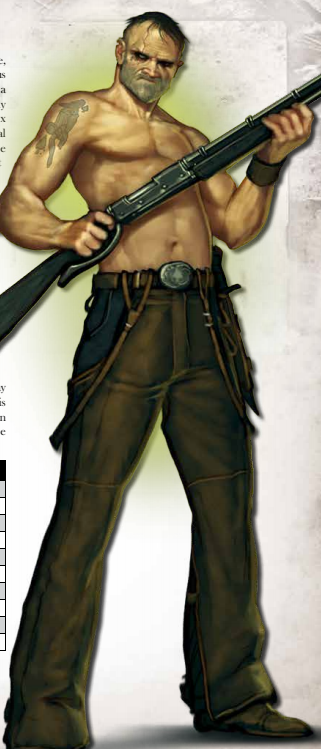
the Pioneer sought a better life in Malifaux, a more exciting one. They headed out to found a homestead, to tame the wilderness. They ended up finding clues to the mysteries of this strange world. Sometimes they sell those discoveries, sometimes bury them. They face monsters and beasts often, and typically those are fast and small. They prefer weapons with a spread to keep things from dodging. The pioneers set out across the Badlands the Bayou, and they'll do anything to stay safe. They're hardy survivors, self-motivated and strong. Their Pursuit Talent is Rugged Individual , which works on Training skills and tests. Their starter gear is a non-magical skill toolkit.
As they advance, they gain:
-
1. Born Under A Wandering Star: You can never suffer any penalty to Navigation or Wilderness tests.
2. A General Talent.
3. Circle the Wagons: You may discard a card to make all friendly characters that can hear you treat all cover as Hard cover. OR Tough As Nails: Attackers cannot declare Triggers against you via Melee or Ranged strikes.
4. A General Talent.
5. Circle the Wagons OR Ornery: When you suffer a Critical Effect, the Critical Effect flip gets a -3. You may take this more than once, and the effects stack.
6. A General Talent.
7. Tough As Nails OR Soldier On: At the beginning of Dramatic Time, you may heal 2/3/5 damage, if you have 1 or more Wounds remaining. In addition, you may have any friendly character that can hear you also heal 2/3/5 damage, if they have 1 or more Wounds remaining.
8. A General Talent.
9. Soldier On OR Ornery
10. Relentless
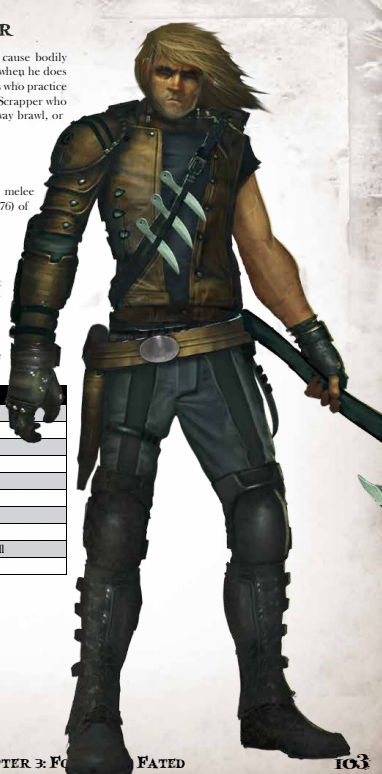
The Scrapper is a master of the brawl. Martial arts, boxing, melee weapons - it doesn't matter. These are people who do more than just hit - they perfect the skill of hitting. The martial arts of the Three Kingdoms are actually rather rare among them - there just aren't that many studying Asian martial arts in Malifaux. Savate is more common, as are Greek and Roman martial arts. The most common training is purely practical, though - street combat. The skills of the scrapper are more useful in these times of magic - their skills often seem quasi-mystical or magical in nature. They're also very hard to spot in a crowd. Their Pursuit Talent is Bloody Minded , which works on Close Combat skills and tests. Their starter gear is any melee weapon and armor with a combined value no more than 25 scrip.
As they advance, they gain:
-
1. Close the Gap: When you declare a Charge action, you may draw a card.
2. A General Talent.
3. Flurry OR Recovery: You get a bonus to all Healing flips. You may take this multiple times, and the effects stack.
4. A General Talent.
5. Flurry OR Watch Them All: You get a bonus to any attempt to resist intimidation or deception, and a bonus to all Initiative flips.
6. A General Talent.
7. Recovery OR Wicked: When you make a disengaging strike, you deal damage with your weapon in addition to stopping your target's movement.
8. A General Talent.
9. Wicked OR Watch Them All
10. Melee Expert: You get an additional Action Point each turn, usable only to make a strike with a melee weapon.

The Tinkerer is an innovator, a master of technological creation and magic alike. They were the ones to invent the pneumatic limb, to create the first Constructs. They've even created some that are truly intelligent. They often start quite optimistic, though it rarely lasts. They are mad scientists and geniuses - occasionally mixing science with necromancy, but more often remembered as the great minds of the Union. Most see magic as an esoteric science, but not all. They are all curious and clever folk. Their Pursuit Talent is Gear Head , which works on Magical skills and tests. Their starter gear is a Grimoire containing one Enchanting Magia, one Sorcery Magia and 3 Immuto. They also get a Magical Theory talent if they don't already have one.
As they advance, they gain:
-
1. Push the Limits: You may cause a construct under your control to suffer 1 unreducable damage to give it a bonus to its next action. You may use this on yourself if you have at least one pneumatic limb and are using it for your next action.
2. A General Talent.
3. Combat Construct: When you use Artefacting to create or repair a construct, you may give it a Pneumatic skill equal to your Artefacting skill. OR Percussive Maintenance: On any Artefacting challenge to repair contraptions or constructs, if you draw a Tomes card you gain an additional Margin of Success.
4. A General Talent.
5. Combat Construct OR Unrealistic Expectations: Your pneumatic limbs, as a group, improve one Physical Aspect by 1. You may change which Aspect by spending an hour tinkering. The TN of repairs to any pneumatic limbs you create is reduced by 5, to a minimum of 1.
6. A General Talent.
7. Percussive Maintenance OR Multi-Tasker: When you take a (1) Order action, you may give orders to two construct subordinates instead of one, and these orders can differ from each other. You may take this multiple times, increasing the number of constructs you can order by 1 each time.
8. A General Talent.
9. Multi-Tasker OR Unrealistic Expectations
10. Over Pressure: On any Pneumatic attack, if you draw a Tomes card, then at the end of the turn you may make a single extra attack with a pneumatic weapon, which may not activate any Triggers. This can only be activated once per turn.
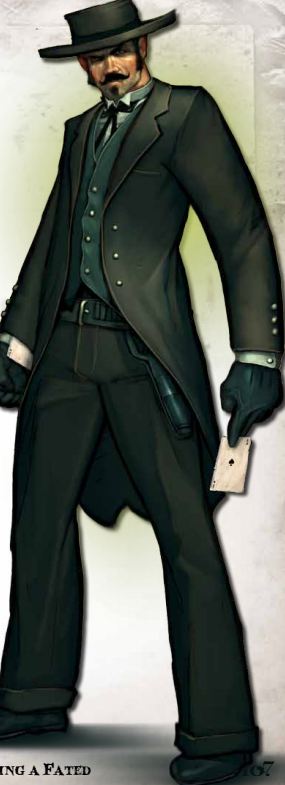
The Wastrel is a gambler, a dandy or a drunk. They'll do anything to gain an upper hand, but they're too proud to cheat . Cheaters go on the list, after all - the list of names to avoid or take down. To survive on your gambling skills and your wits isn't easy, and often they stick together socially. Several get involved with organized crime. Others just prefer to play for high stakes and fame. Many believe their skills are supernatural. They are able to manipulate practically any situation to their advantage - and their powers are pretty much all meta card tricks, which is pretty great. Their Pursuit Talent is Educated , which works on Expertise skills and tests. Their starter gear is a non-magical skill toolkit.
As they advance, they gain:
-
1. Luck of the Draw: When the GM reshuffles the main deck, you draw 2 Twist cards instead of one.
2. A General Talent.
3. Cards Up A Sleeve: You may place one Twist card from your hand on the table, face up. Any player may discard a card to Cheat Fate with the face up card, after which it goes into your discard pile. OR Trump Card: During Dramatic Time, you may discard a card after taking your turn. If you do, you may look at the top 3 cards of the main deck and replace them in any order. You may not tell anyone what cards are there, but you may hint if they are good or bad.
4. A General Talent.
5. Cards Up A Sleeve OR All In: When you have no Twist Cards in your hand, you get a bonus to all Duels.
6. A General Talent.
7. Trump Card OR Play For Blood: While you are suffering one or more Critical Effects, on any challenge where you draw a Crows card you gain one additional margin of success. You may take this multiple times, increasing the margins of success by 1 each time you do.
8. A General Talent.
9. All In OR Play For Blood
10. Fifty-Fifty Chance: Once per Dramatic Time, you may 'stack the deck.' To do this, remove the Jokers from the deck and discard pile and place them facedown. The GM randomly shuffles one of them into the other 52 cards, and then you place the other one on top of the deck. No one may look to see which Joker is actually on top.
Next time: Advancement and general Talents.
Post 12
Original SA post Through the Breach: The Fated AlmanacI was a little wrong earlier when I talked about advancement. Each game session ends in an Epilogue, which always begins withg the GM talking whay Destiny, if any, was in play during the session and if anyone got a step in their Fate resolved or denied. If anyone did, they can either improve an Aspect by one point or gain a Manifested Power - basically, a personal magical power designed with the GM. Then, everyone gets 1 XP. If some important story milestone happened, there may be between 1 and 3 additional XP. At that point, the group talks about any lessons their characters learned ('nothing at all' is a valid answer) and the GM chooses 3 skills for each PC which could potentially be advanced. Each player picks one, or another skill from the allowed ones of their Pursuit Talent. If the skill has no rating, the PC gains it at 1 fir free. Otherwise, the PC can spend XP equal to the current skill rating to advance the skill by 1, or may save up their XP for later. After that, the PC can spend 1 XP to get rank 1 in any skill they like, regardless of if it was picked. Lastly, the character gains a Step in their current Pursuit. That was what I was wrong about - you get a new Pursuit step every session, not every adventure. So new talents flow pretty freely.
After this, the game explains its Skills, but I already went over the list, and they're all essentially self-explanatory. If you have questions, feel free to ask. But now we move on to General Talents. Many have requirements, and in many cases the requirement is having a stat that is below 0. You only need to meet the requirement when you buy the Talent - if you no longer meet it, you still keep the Talent during play.
Armor Training: You reduce the penalty to Defense from armor by 1, to a minimum of 0. You can take this multiple times.
Better Part of Valor: Requires Tenacity -1 or lower. You cannot Charge, but you get +2 to your Walk speed.
Blissful Ignorance: Requires Cunning -1 or lower. Whne you fail a Horror duel, you get the Slow condition instead of the Paralyzed condition.
Call Shot: Choose a skill. When you generate a Critical Effect with an attack using that skill, you may discard a card to change the Suit of the Critical Effect to the Suit of the discarded card. You may take this multiple times, for a different skill each time.
Calm & Collected: Requires Speed -1 or lower. You increase the value of any Focused condition on you by +1, to a maximum of Focused +3.
Clear Orders: Requires Leadership 3 or higher. When you take the Order action, you may Cheat Fate for the ordered character.
Combat Reading: Requires Cunning 1 or higher. When you make disengaging strikes, you add half your Scrutiny skill to the value. (Rounding up, presumably.)
Counter-Spell: Requires Counter-Spelling 3 or higher. When you are targeted by a magical attack or action, the attacker loses any Suit associated with their magical skill. (Not with a random flip, but funny thing is, NPCs don't make random flips. )
Critical Strike: Requires Specialized Skill with the chosen skill. Choose a skill. All attacks with that skill, when you cause damage with it and draw a Rams card, deal one additional damage for each Rams suit in the final total. You may take this multiple times, but for a different skill each time.
Cynic: Requires Charm -1 or lower. You get a bonus to any duel to resist deception.
Flick of the Wrist: Requires Might -1 or lower. When making a close ocmbat attack with a one-handed weapon, you may use Grace instead of Might.
Governor's Gift: Requires Charm 1 or higher. Choose a sex. You get a bonus to Bewitch or Scrutiny duels against members of that sex.
Great Fate: You draw an additional card at the start of each session. You may take this multiple times and the effects stack, but you must always discard down to 5 cards if you have more than 5 in your hand, as normal.
Gruff: Requires Charm -1 or lower. Scrutiny duels made against you suffer a penalty.
Hard to Kill: Requires Resilience 1 or higher. You may ignore one Critical Effect per Dramatic Time.
Hobbling Attack: Requires Specialized Skill with the chosen skill. Choose a skill. When you succeed on any attack with that skill and draw a Crows card, the target gains the Hobbled condition for the rest of the Dramatic Time. a Hobbled character can only make one Movement action per turn.
Honest: Requires Cunning -1 or lower. You get a bonus to all Convince and Leadershi[ duels with any character that is at least neutral or friendlier towards you.
Imposing Mass: Requires Grace -1 or lower. You get a bonus to disengaging strike duels.
Ingenious: Requires Might -1 or lower. You add half your Intellect to any duel that normally requires tools, such as Crafting. (Rounding up, presumably.)
Just A Graze: Requires being a PC. You may Cheat Damage flips you suffer, as long as they have no bonus.
Open Hand Fighting: If you are unarmed or wielding a single one-handed weapon, you may choose to have your attacks deal damage when making disengaging strikes.
Paired Weapons: Requires rank 3 or higher in the chosen skill. Choose a Close Combat or Ranged Combat skill that qualifies. You get a bonus to your attack flip when wielding two of the same weapon that uses that skill. This does not apply to two-handed weapons, and you make only a single attack for both weapons, gaining no boosted damage.
Plain Spoken: Requires Intellect -1 or lower. You get a bonus to Social duels made during Dramatic Time.
Quick Study: Requires Intellect 1 or higher. Whenever you would gain a skill, you may choose any skill you don't have but saw a friendly character successfully use, instead of the options the GM presents.
Rush: Requires Speed 1 or higher. You get +1 to your Charge. You may take this multiple times, and it stacks.
Scoundrel: When you draw a Masks card on any Social challenbge, you may make a free Pick Pocket action as part of resolving the challenge. This Pick Pocket action gets a bonus.
Shot Studies: Requires Shotgun 3 or higher. If you have Focused +1 or higher, multiply the range of any Carbine or slug-firing Shotgun you are wielding by 10.
Shove Aside: Requires Might 1 or higher. You may move through characters with a Height lower than your own without being impeded, though they may still make disengaging strikes against you.
Shrug Off: Requires Resilience -1 or lower OR the Ortega Station. You may take the (0) Shrug Off action: discard a card to remove on condition on yourself.
Simple Logic: Requires Intellect -1 or lower. You get a bonus to resist Bewitch, Convince and Deceive duels against you.
Skill Mastery: Requires being a PC. Choose a skill. You get a bonus on all challenge flips with that skill. You may take this multiple times, for a different skill each time.
Specialized Skill: Requires being a PC. Choose a skill and a Suit. Add the Suit to the chosen skill's value. You may take this multiple times, for a different skill each time.
Sturdy: Requires Grace -1 or lower. You get +1 Wounds.
Sure-Footed: Requires Speed -1 or lower. You may apply your speed as a penalty to the distance, in yards, that you are pushed by any effect.
Twisted Fates: Requires being a PC. Choose a card in your Twist Deck and increase or decrease its value by 1. You may never have two cards of the same value and suit - you can have two 8s, but they must be of different suits, for example. You may take this multiple times.
Unassuming: Requires Might -1 or lower. You get a bonus to any duel to avoid being noticed in a group or angering someone.
Undermine Confidence: Requires Resilience -1 or lower. You get a bonus to all Intimidation duels not made during Dramatic Time.
Unequaled Accuracy: Requires a rating of 2 or higher in the chosen skill. Choose a Ranged Combat skill. You do not randomize your target when firing into an engagement using that skill.
Unimpeded: Requires Grace 1 or higher. Ignore all terrain penalties when taking Movement actions.
Wall of Muscle: Requires Resilience 1 or higher. Increase your Height to 3 and increase the range of all melee weapons you wield by 1 yard, to a maximum of 3 yards.
Will of Ages: Requires Tenacity 1 or higher. When you are using the Magical Shielding effect of the Counter-Spelling skill, you may shield a number of additional friendly characters, including yourself, equal to your Tenacity.
That brings us to the equipment section. It is written in character as a Guild catalog with a bunch of mercenaries and fighters scribbling in the margins. It's actually pretty damn entertaining. All weapons and armor have access to customizations, on top of whatever traits they have already. Guns, for example, can be 'blued' or parkerized, giving them a nice finish and a double bonus to resist damaging corrosive effects, or get a custom grip to make them more accurate, or a custom action to increase the range. They can be nickel-plated, to give a bonus to Bewitch when you're using the gun to impress people. Or you can reduce the cost by making it a shoddy weapon - it can't cause Triggers. Each gun has a full IC description, often with comments, and I find them pretty entertaining. There are rules for both 'legacy' firearms - single shot guns, mostly - and modern revolvers and rifles. Rifles are nice in that their range automatically increases the more you spend time Focusing (IE, taking actions to aim). You can also use a bow and arrow if you like, with the benefit of never needing to spend turns reloading. (Unless you like a crossbow.) Melee weapons are available, and can be customized as well, though mostly to make them bigger or smaller, or to make them balanced for throwing. (Or to use folded steel, which gives some hefty damage boosts, but is pricey.) Armor exists. Light Armor is pretty easy to get, while Heavy Armor requires more protection. Armor also tends to grant protection from certain kinds of critical effects once per scene, and some armor only does that, rather than provide any armor or shield bonus. You can get a robot limb, which always grants some armor and room to augment the limb, allowing you to get super strength or super speed or integrated guns or tools. It's not cheap, though. Skill toolkits are available - they give you tools use a skill type, and a bonus to a specific skill. They're costly.
Anyway, now that we're past all that, we are finally into actual explanation of game mechanics. For most actions, the GM will just let you succeed unless the action is important to the plot or has some significant ramifications. In that case, you need a Duel. The GM chooses a target number, with higher being harder. You flip the top card of the main deck and add the value of that card to some of the numbers on your sheet - usually an Aspect and a Skill. If you beat the TN, you succeed. Sometimes, a TN will have a suit requirement as well as a number, or even multiple suits required, which generally means you're going to have a specialized skill to hit both suits. The main Fate Deck contains two jokers as well. The Black Joker is worth 0 and the Red Joker is worth 14. All other cards have their face value, from 1 to 13. (If you're using a regular deck, Aces are 1, Jacks are 11, Queens are 12 and Kings are 13. Rams are Hearts, Crows are Spades, Tomes are Clubs and Masks are Diamonds.)
The most basic kind of flip is the Challenge Duel, which works exactly as described above. You try to do a thing, you flip a card, you add your numbers. However , every player has a hand drawn from their Twist Deck - generally 3 cards from that 13-card deck at the beginning of the game. You draw another card whenever the GM has to reshuffle the main Fate Deck due to running out of cards. During any Challenge in which you are using a skill you have a non-zero value in, you may choose to play a card from your hand to replace the flipped card. (Never mix your Twist Deck's discards with the Fate Deck's, though, they're seperate.) Your hand can never have more than five cards, and if it does, you must discard down to five immediately. To give a solid example - let's say you're trying to hit a TN 12 and you draw a 2 of Tomes. That's not enough with your +5 bonus, so instead, you play a 7 of Crows from your hand - just enough to hit 12 and succeed.
Flips can have modifiers. I have been referring to them as 'a bonus' and 'a penalty' - in the text, they are shown as a black card containing a + or a white card containing a -. For each bonus you have, you flip an additional Fate Card, and you choose which of the cards you want. For each penalty you have, you flip an additional Fate Card and use the lowest value among them . Bonuses and penalties cancel each other out 1 for 1 if there are both applying to any single duel. However , no matter how many bonuses you have, on any flip that includes the Black Joker, the Black Joker must be used. And no matter how many penalties you have, any flip that includes the Red Joker and not the Black Joker may use the Red Joker.
Each deck, both the main Fate Deck and each player's Twist Deck, maintains its own discard pile. When you run out of cards in your deck, you shuffle your discard pile and it becomes the new deck. You may not look at or change the order of cards in any discard pile. As I noted, whenever the GM reshuffles the main Fate Deck, you get to draw a card. In fact, this happens any time the GM touches the main Fate Deck. (Shuffling only counts as one touch.) The GM can choose to reshuffle the deck when an important story moment resolves, and must reshuffle when the final card is flipped. Sometimes, a character's actions can force a reshuffle - in the case of flipping the last card, the card flipped is not shuffled in, but is discarded after the shuffle. Twist Decks are only reshuffled if you would draw a card when there are none remaining, and after a Twist Deck reshuffle, the GM may cut the deck. There are no further benefits to reshuffling the Twist Deck. Lastly, whenever a Dramatic time scene ends, each player may discard any cards they like, and then draw back up to 3 cards if they have less than that.
Next time: Triggers, more detailed Duel rules anbd more.
Post 13
Original SA post Through the Breach: The Fated AlmanacSo, what is a Trigger? You remember all those Talents that mentioned drawing a specific suit of card? Those are all Triggers. To activate a Trigger, you need to meet the conditions it requires - having a specific Suit in your final total during a specific type of action. Occasionally, they'll care if you succeeded, failed or dealt damage with that action. Most Triggers are from Talents; NPCs can also have Triggers that work based on what your total is, too.
So, the actual full provess of a Duel depends on what kind of Duel it is, but most are Simple Challenge. You do a thing, it has an immediate effect. The game breaks it down to a nine step process that, in play, goes much faster and more intuitively.
1. Dtermine the TN. Very easy tasks might have 3 or 4, while a nearly impossible one might be 20 - something you won't hit without a great Aspect, Skill and card. The TN may also have a Suit associated with it, typically for magic. Don't have that Suit in your result? You're SOL.
2. Generate your initial Acting Value, before flipping any cards. You take your Aspect and add it to your Skill and apply any Talents that would add a Suit to it or some other modifier. If you're only using an Aspect for some reason (say, just Might to lift a heavy thing, though you could in theory use Might+Labor for that) then double the Aspect.
3. Calculate any Fate Modifiers - that is, bonuses or penalties. One bonus cancels out one penalty and vice versa, so you will always end up with either nothing, or just Bonuses, or just Penalties. This determines how many cards you flip.
4. Flip the right amount of cards and calculate the Duel total now, adding the value of the card and its suit to the Acting Value determined in step 2.
5. See if that's enough.
6. If it's not, you may opt to Cheat Fate and replace the card with a Twist Card from your hand. However , you cannot Cheat Fate if any of the following are true: You lack the appropriate skill, you flipped the Black Joker or you have one or more penalties.
7. Determine the final result and see if that's enough.
8. Declare Triggers if you have any that you want to use. Triggers most commonly require you to have succeeded at the check, failed it, resolved it (which is any result) or caused damage.
9. Apply the results. For every five points by which you beat a TN, you get a Margin of Success. For every five points by which you miss, you get a Margin of Failure - so a 16 against a TN 10 has one Margin of Success. This primarily notable for attacking and for ongoing challenges.
Ongoing challenges are those which take a long time to resolve. They are broken into a series of related Simple Challenges, which can often use several skills. Ongoing Challenges have a TN, which may fluctuate over the coruse of the Challenge, a Duration, which is how long each taste takes to complete, and an Increment REquirement - how many successes need to be gathered before it's complete. Generally, while you're doing an Ongoing Challenge, that's all you can do, and you need the GM's permission to take any other actions during it. Every time the duration passes, you can make a challenge duel against the TN. If you succeed, you gain one success, plus an additional success per Margin of Success. Once you build up enough to meet or beat the Increment Requirement, you're done. However, if you fail, you subtract a success per Margin of Failure (so if you fail by less than 5, the total stays the same). Typically, an Ongoing Challenge only totally fails if somethings goes catastrophically wrong or you run out of time. If you hit a deadline, well, got to abandon the job and can't come back to later, most of the time. Catastrophic Failure happens when you draw a Black Joker or when you get four or more Margins of Failure on consecutive tests - four at once, three and then one, two and then two, one four times in a row, whatever. If that happens, you fail the challenge and lose any supplies and will have to start over, if that's possible.
Multiple characters can work together on some Ongoing Challenges, which can greatly increase success or reduce time required. This can be handled two ways. First, everyone works on their own, so you get multiple tests per Duration, and everyone gets a chance to add to the success total. Alternately, if someone doesn't feel good about their skill in the situation, they can work wither another character. They make no tests of their own, but each assistant adds a bonus to the leader's action.
Combat comes next, and with it, we get the distinction between the two types of time the game uses. Much of the game takes place in Narrative Time. The passage of time is not critical to the game, and it goes by as fast as it needs to to move the story along. This is the part where montages happen or cuts to later or whatever. Narrative Time covers extended efforts over the course of hours or days, too, and until the GM says otherwise, Narrative Time is what's in effect. It's loose and not tracked particularly strictly. It's flexible. During Narrative Time, you can take any action, and unless there is a cost to the action, such as discarding a card, or a big risk of failure, you may assume that for any flip you flipped a 10 by taking a moment to focus. There's no deadline, no real pressure, so you just got a 10 with any suit you like. You can cheat a higher value card if you want, but there's often no reason to. When you Assume 10 this way, you cannot declare Triggers.
Dramatic Time, on the other hand, is stricter. It's for when conflicts escalate and it becomes important to know what's going on when in a very real and fine sense. It is measured in combat rounds, which last for about five to six seconds each, with the exact length at the GM's discretion. Most Dramatic Time scenes involve multiple characters, and actions take place by Initiative Order. On your turn, you declare and execute your actions, and you get one turn per round, though you can take multiple actions in that turn. Whenever Dramatic Time ends, every player may discard as many cards as they like and draw back up to three if they have less after discarding.
When Dramatic Time begins, every character makes an Initiative Flip - a Challenge Duel based on Speed Aspect and Notice skill. There is no TN - the highest number goes first, and the rest in descending order. If there's a tie, PCs always go first, deciding amonst themselves who goes in what order. If they can't agree, the GM picks. NPCs do not flip - they just add their Rank value to their Speed and Notice, so similar NPCs will often go all at once in whatever order the GM likes.
When your turn starts, you follow this order:
1. Start of turn effects. Resolve anything that happens automatically at the start of your turn, in whatever order you like.
2. Generate AP. Every character receives two Action Points by default, but certain talents or effects can increase or decrease this number.
3. Spend your AP on Actions and resolve those actions. If you have any AP left after resolving an action, you can spend it on other actions. You can declare actions as you go, they don't have to be pre-decided.
4. Resolve any automatic end of turn effects in whatever order you like.
Actions are preceded by parentheses containing a number - that number is the number of AP you have to spend to take that action. Don't have that much? Can't do it. You do not have to spend all your AP in a turn, but any you don't spend are lost. Some Talents will give you extra AP that can only be used on specific actions; the effect that does this will tell you what the AP is good for. You can only use one bonus special AP per turn, so if you have multiple special AP sources, you choose which applies each turn. Some actions have a 0 AP cost, but you can by default only perform one 0-AP action per turn. The GM may loosen this at their discretion. The following actions are available to all characters.
Combat Actions
(2) Charge: You target someone you can see and move your Charge range directly towards them, then take two 1-AP melee attacks against them if you are in range. You may not Charge if you are engaged currently or if you have no Charge range.
(1) STrike: You target another character or object within range of a chosen weapon, ranged or melee, and perform a single attack with it.
Tactical Actions
(#) Defensive Stance: You may discard a card. If you do, you get the Defensive +1 condition until the start of your next turn, usable a number of times equal to the AP spent on this action.
Defensive +1: You gain a bonus when you use Defense to resist an attack.
(1) Focus: You gain the Focused +1 Condition until you resolve an Action other than Focus. You may take this action more than once, and it stacks up to Focused +3. You can only take this action in Dramatic Time.
Focused +X: You gain a number of bonuses to your next non-Focus action and any resulting damage flip equal to the value of Focused.
(1) Impose: You make an appropriate Social test, usually Intimidate, against a TN of your target's Tenacity+Scrutiny. If you succeed, the target suffers a penalty, plus another penalty per Margin of Success, to any attack that does not include you as a target.
(1) Trick: You make an appropriate skill challenge, such as Deceive or Sleight of Hand, to misdirect your foe, against a TN of their Cunning+Awareness. On a sucess, you get a bonus to any melee or ranged attack action and damage flips until the start of your next turn. In addition, you get a bonus to Defense Flips made against the target until the start of your next turn.
(#) Reload: The cost of a reload action is listed in a weapon's stats, if it requires reloading. It may take more AP than you have, in which case you can continue to take Reload actions on your next turn to accumulate AP on reloading. Once enough is spent, the weapon is reloaded.
Movement Actions
(1) Drop Prone: You drop to the ground, gaining a bonus to Defense against Ranged attacks and a penalty to Defense against Melee attacks.
(1) Stand Up: You stop being prone or knocked down.
(1) Walk: You move your Walk range, not necessarily in a straight line or in any specific direction.
(2) Run: You move twice your Walk plus your Athletics skill, again, in any direction and not always in a straight line.
Universal Actions
(1) Assist: You declare who you are going to help and what you're helping with. When the target performs the action you're helping with on their next turn, they get a bonus to it.
(#) Use Skill: You spend AP determined by the GM to do a special skill challenge, possibly as part of an Ongoing Challenge or to pick a lock during dramatic time. Most of the time this will be 2 AP but is sometimes 1.
(1) Evaluate: You examine some aspect of the situation, possibly to identify a weakness or escape route. Usually this requires a Notice or Scrutiny challenge.
(1) PAss: You do nothing, but add 1 to your Initiative for the rest of the Dramatic Time.
(1) Order: You give a command to a subordinate you control, such as a zombie, elemental or construct minion. The ordered character acts immediately after your turn ends, and you control it for that turn. If a PC takes this action, the ordered character makes flips as if it were a PC but cannot Cheat Fate.
(1) Ready Weapon: You draw a weapon and arm it for use.
Next time: Specific Movement and Attack rules
Post 14
Original SA post Through the Breach: The Fated AlmanacMovement stuff...well, first of all, you can't just walk past a guy in combat. If you try to leave melee range with a Walk action, the person you are moving away from can interrupt you with a disengaging strike - basically, they make a melee attack against you, and if they hit, you stop moving but take no damage or other effects. (Normally.) Special movement, like climbing or vaulting a gap is usually part of an Athletics check as part of a Walk or Run action, with difficulty based on the conditions and surface. Climbing a steep hill is pretty easy, climbing a vertical wooden plank wall is pretty fuckin' hard. Without a check, it's assumed that any PC can jump 18 inches straight up, one yard horizontally from a standing start or two yards with a running start. Further means an Athletics check. Standing long jumps are part of a Walk, with running ones as part of a Run. Climbing generally goes at half your Walk, but faster if you succeed well on a climb check.
Swimming is also half your Walk, and it's assumed any character can stay afloat indefinitely in calm waters. Moving quickly is a (2) Use Skill action that moves you at Walk + Athletics, but no roll is needed. Tougher water conditions require Athletics checks, though. Pushing, shoving, dragging orp ulling all functions as a push movement, and most movement penalties do not apply to pushes. You just move the distance of the push, and you don't trigger disengaging strikes. Flight allows you to bypass terrain and other characters without penalty, but you still get disengaging strikes if you don't have the altitude to be out of range. Falling at least three yards triggers fall damage, with it hurting more for every additional two yards fallen. Falling is also special - normally, when you draw the Black Joker on a damage check, you take no damage, no matter what. If you fall from a height that would normally kill you instantly even on a minimum damage check, though, all the Joker means is you survived and land with 0 Wounds left and probably a lot of lasting injuries.
Attacking works specially when NPCs do it - only PCs flip cards, so any modifiers that would apply to an NPC instead apply in the opposite manner to the PC's defense - so if the enemy would get a bonus, instead the PC gets a penalty. Attacks follow a special sequence because they involve multiple tests. For the attack, it's just like any normal challenge, really, if the PC is doing the attacking.
1. The TN will be the target's Defense or Willpower, plus their Rank. All weapons not explicitly stating otherwise target Defense. Magical attacks also have to beat a casting TN in addition to the enemy's resistance - if they fail at either one, the spell doesn't go off. If an NPC has any modifiers that would modify their Defense, they instead raise the attack's TN.
2. Acting Value - this is typically calculated via relevant Aspect and weapon/spell skill.
3. Modifiers as normal. If an NPC has any modifiers that would improve or harm their defenses, they are reversed and apply to the attack - so an NPC in a Defensive Stance applies a penalty to a PC attacking them, rather than getting a bonus to defense.
4-8. Resolve as normal.
9. If you hit, there is now a damage flip. If the attack hit as a tie, the damage is at two penalties. If there were no margins of success, one penalty. One margin of success, no penalty. 2 or more margins of success, one bonus.
When an NPC attacks, the PC still does all the drawing.
1. The TN is based on the attacker's Aspect, Combat skill and Rank. If the NPC has anay abilities that, in PC hands, would make attacking easier, they instead add to the TN.
2. The Acting Value is typically based on your Defense or Willpower aspect.
3. Modifiers as above, but the NPC's modifiers to attack are the ones reversed instead.
4-8. Resolve as normal.
9. If you fail, there is now a damage flip. If you had no margins of failure, it's at a penalty. If you had 1, no penalty. 2, a bonus. 3, two bonuses.
Common attack and defense modifiers include: Attacking blind, which causes 2 penalties. A Called Shot will typically give a +4 to the TN to an attack. Having a superior position, such as high ground or having someone trapped against a cliff or wall. This gives the attacker a bonus. Cover comes in two types - soft and hard. Soft cover is stuff like tents, tapestries or plants, while hard cover is stuff like rocks, trees or animals to hide behind. Soft cover gives a penalty to the attack flip, while hard cover gives a penalty to both attack and damage. Fighting on an unstable platform gives a penalty to attacking.
If you want to make a ranged attack on someone who is engaged with other people, the target is selected randomly. You flip one card for each character within a yard of your target and hit whoever got the highest card instead. You can take Talents to prevent this, or you could Cheat your attack down if you accidentally shoot an ally. Whoops!
So, damage. How's damage work? It's pretty special. There's no TN, so you just determine modifiers. Most commonly, that'll be from how accurately someone got hit. You flip cards as normal for the damage - and it's always the player who flips, either dealing or receiving the damage. If there is no modifier or there's a bonus, the attacker chooses which card is used. If there's a penalty, the defender chooses. If the Black Joker shows up, it must be chosen, period. If the Red Joker shows up but the Black Joker doesn't, it must be selected, too, even if the attack is at a penalty.
You can Cheat Fate on damage...sometimes. You may not Cheat Fate on damage if either is true: You are the target of the damage flip, or you're the attacker and the attack has a penalty. All attacks have three damage values, presented like this: 1/2/3. The first is Weak damage, the second Moderate and the third Severe. If the Damage Flip got a Black Joker, no damage is done at all. 1-5, Weak damage. 6-10, Moderate. 11-13, Severe. The Red Joker is Severe damage and triggers a Moderate Critical Effect. The person taking damage reduces their wounds by whatever the damage value. If that reduces them to 0 or below, they also suffer a Critical Effect, with level equal to the damage's type - Weak, Moderate or Severe.
If you hit 0 or fewer Wounds, you risk falling unconscious. You must pass a TN 10 Tenacity+Toughness challenge, taken when you hit 0, whenever you suffer a Critical Effect or at the end of any turn where you took an action while having 0 or fewer Wounds. You can be revived with a (2) Use Doctor action, TN 10. Some attacks deal set damage, no flip involved, and others deal blast damage, marked by a mushroom cloud next to the number. Anyone nearby also gets hurt at the step below the damage dealt.
Armor comes in two types. If you have any Light armor at all, you are lightly armored and get Armor +1. Doesn't matter which hit location it's on - there's four. Head, body, arms and legs. Any single one can have Light Armor and you will be lightly armored. If you have one location with Heavy Armor and at least two more with Light Armor or better, you are considered heavily armored and get Armor +2. A pneumatic limb gives an additional +1 Armor, so the max a PC can have is Armor +3. (Some NPCs can have more.) Armor directly reduces damage dealt. However, if you lock the Armor Training talent, you also reduce your Defense by your Armor value. Also, you can't reduce damage below 1 with Armor.
Critical Effects target a hit location. You flip a card to determine how bad it is and where it hits. Rams hit the body, Tomes hit the head, Crows hit the arms, Masks hit the legs. Most armor will prevent a single critical effect to the location they protect, even if they provide no Light ARmor or Heavy Armor. The higher the number of the card, the worse the hit is. And if you draw the Red Joker? No critical effect whatsoever. Nothing happens. Black Joker? It is the highest possible effect on the chart, which for Weak damage or Moderate damage means 'draw again and move up a chart'. For Severe damage? It means the hit location got blown the fuck off, and you draw a card to figure out which one.
Weak Criticals at low numbers are stuff like 'you get a penalty to all Social challenges until Dramatic Time ends' and at the upper level are 'you take an additional damage' or 'you get the Paralyzed condition.' Moderate Criticals at low numbers are 'You get a penalty to all challenges, but at tne end of each turn you can make a TN 10 Toughness challenge to end this.' At high numbers, they're 'you gain the Paralyzed condition until Dramatic Time ends due to nerve damage.' And Severe? At low numbers it's 'generate two Moderate criticals' or 'Get a penalty to all Social actions until all damage is completely healed.' At upper levels it's 'you are bleeding out' or 'the hit location is crippled and made useless, if this hit the head you go blind or deaf, if it hit the chest you fucking die' or 'a large part of your body is ripped free; if this hit tyhe head or chest, you fucking die.'
Conditions! Conditions are ongoing effects. If they have a number, they can stack. If they don't, they can't and you ignore any second instance. Normalyl, they leave at the end of your turn unless what put them on says otherwise. Common conditions:
Blind: You get two penalties to any action requiring Sight, including most attacks.
Bleeding Out: You will die in 10 rounds if the condition is not removed. This condition is not removed at end of turn, but requires a (2) Use Doctor action at TN 15 to remove.
Burning +X: At the end of each round, you take damage equal to the Burning value. The effect is removed once damage is dealt. Anyone within a yard of you, including you, may take a (1) Action to remove 1 from the Burning value. If it hits 0, it goes away.
Dazed: All actions suffer a +2 TN modifier.
Defensive +X: You get a bonus to Defense duels, but each time you use it, the value drops by 1. You lose the condition when it hits 0.
Intoxicated: You suffer a penalty to all Willpower tests.
Fast: You generate an additional ACtion Point. This condition is removed at the end of your turn, or if you get Slow while you have Fast. (They cancel out.)
Focused +X: You get X bonuses to your next non-Focus action and any resulting damage checks. Focus maxes out at +3.
Paralyzed: You generate no AP and can declare no Actions at all, even (0) Actions. This normally ends when your turn does. If you get the Reactivate condition, it cancels out Paralyze.
Poisoned +X: Each round, you take 1 damage that can't be reduced and reduce the Poison value by 1. If it hits 0, you lose Poisoned. It cannot be removed until it hits 0.
Suffocating +x: Every turn (or every 5 seconds in Narrative Time) that you cannot breathe, you get +1 Suffocating. At the end of your turn, you must make a Willpower test at TN equal to Suffocating. If you fail, you fall unconscious. If you are already unconscious, you take 3/4/5 Damage. If you hit 0 Wounds or fewer from this, you don't generate a Critical Effect - you just die.
Reactivate: At the end of the round, you may act an additional time, as if you hadn't taken any turn. If multiple characters have this, they act in Initiative order. Paralyze cancels this out.
Slow : You generate 1 less AP than normal. This is normally removed at end of turn. Fast cancels this out.
Useless Limb: If this is an arm, you get two penalties to anything requiring two hands. If a leg, your Walk drops to 1 and you two penalties to anything requiring movement.
Next time: Healing, Horror and Magic
Post 15
Original SA post Through the Breach: The Fated AlmanacHealing is pretty simple - when you would be (non-magically) healed, you make a flip as you would for damage. Black Joker is no healing, 1-5 is 1 damage, 6-10 is 2, 11-13 is 3 and Red Joker is all damage. You make a single healing flip each day that you've had at least 6 hours sleep. If you have a doctor caring for you, you get a bonus. Doctors can care for a number of people up to the Doctor skill.
Anyone with the Doctor skill can also do first aid, which can only be done for someone with 0 or more wounds left, and you need tools. It's Intellect+Doctor, and the TN is 5. You heal 1 damage, plus 1 per margin of success, but someone can only benefit from first aid once per hour. Doctors can also do surgery, which also takes tools. Surgery is what you do when someone has less than 0 Wounds left, and the TN is 10 now. If it succeeds, the target immediately jumps to 0 Wounds. If it fails, the target suffers a Damage flip of 0/0/Killed, with a bonus to the damage flip for each margin of failure. Surgery takes 1 hour per negative wound the target has, and you can only get benefits from surgery once per week.
If you are suffering a Critical Effect that lasts until all damage is healed, it has a chance of being permanent. Once you are fully healed, you make a Resilience+Toughness check, TN 15. If you fail, the Critical Effect becomes permanent. The book suggests Cheating Fate on this if possible. If you had successful surgery, however, you raise your result by the Doctor's Surgery skill.
So, what is Horror? Horror is something caused by certain talents or enemy actions - basically, a mindnumbing terror that can drive you mad. It's a Willpower test, with a TN listed by whatever caused it. If you fail, you gain the Paralyzed condition if it isn't your turn, or you lose all AP and your turn immediately ends if it is your turn. If you pass, nothing bad happens and you become immune to Horror effects from the source of the Horror for the rest of the round.
If you cause a Horror test with, say, a spell, then you make a test against a TN of the target's Willpower plus their Rank, and your acting value is half the TN of the effect you caused. If you have multiple targets, you make just one test, with the result compared against each target's TN. (This can affect other PCs - when PCs act against each other in any way, the defender is treated as an NPC with a Master rank - ie, an automatic result of 11 plus whatever stats are relevant. PVP's not easy.)
Now we finally hit the Magic chapter. On Earth, magic is difficult. Some are potent enough to do it without fueling it with soulstone, but most require a soulstone to do magic there, especially for their most powerful spells. In Malifaux, this is not so - magic is everywhere, in the air itself. Soulstones can still be a great aid to casting, but are not requied. Even mundane people find themselves able to shape magic by their will alone. It's not too uncommon for a gunfighter to be able to shoot fire from their gun or for a martial artist to harden their arms like steel. Those who train can do stranger things still, and more of them.
The Guild, of course, restricts magic use heavily. The work of the Arcanists has weakened their hold on Earth, but in Malifaux they retain control. All magical practice without Guild sanction is forbidden, with brutal punishments enforced. Luckily, the Guild defines magic narrowly. Magically enhanced equipment and pneumatic devices are entirely unregulated, and can be purchased freely - usually from the guild.
There are several codified schools of magic, which attempt to define a set of guidelines by which magic works. It's never really worked - for every law someone defines, magic exists to break it. Teaching a magical theory is rather like teaching art in that way. There's a lot of techniques and truths, you can teach reliable methods, but art remains purely personal and no two people will ever do it in truly the same way. Many sorcerers end up making their own systems, learning from masters or cobbling it together from old writings, and many organized magical systems encourage practitioners to learn the styles of others. Some believe a unified magical theory may one day be discovered.
Whatever the case, you need a Magical Theory to cast spells. The development of your Magical Theory is personal, and if it happens during play, the GM should work with you to create circumstances where you can learn one, rather than using it as a restrictive tool. You may only ever have one Magical Theory, and it permanently shapes how you approach and use magic. Each Magic Theory has an associated talent that you gain when you choose that theory, and you can never lose it. Ever.
The Oxford Method is taught out of the Oxford University of Metaphysical Studies in Mississippi, which recently reopened its doors to students. It's what most people think of when they hear the word 'wizard,' and it commonly uses techniques such as summoning circles, magical formulae and ritual words of power. It teaches that magic comes from a mindscape, an imagined reality you come up with which you harness via gestures and magical words. Use of wands, staves and runes is not uncommon. The talent it comes with increases the Action Point cost of any spell you cast by 1, after any adjustments for Immuto. However, you get a bonus to the casting check of any spell with an AP cost of 2 or more.
The Whisper is not quite a theory, and it doesn't come from the minds of mortals. What is known of it has been taken from the ramblings and dying words of those mad enough to practice necromancy. They speak of a driving force, something that teaches them their mad powers. This condition has been named the Whisper, and it drives those who suffer it to ever more complex necromantic creations, with skills acquired almost spontaneously. You might wake one morning with no magical skill, but the Whisper will guide you by nightfall. The talent? You get a bonus to all Necromancy checks or to any spell with an undead target. However, your madness gives you a penalty to all Intellect checks.
The Darlin Theories are less a codified system of magic and more a collection of essays and scientific treatises on magic. It's the closest to a science that has ever been made out of the arcane arts, and is named for Aaron Darlin, the Mecha-Tyrant of Virginia, who was famously responsible for 1791 Conflagration of Richmond. He died a year later, but his works circulated widely after his death, and his name is now synonymous with steam and clockwork-powered magic. The core metaphor of the Darlin Theories is that magic is shaped by discovery, and so practitioners are encouraged to create their own theories about magic's interaction with steam and clockwork. However, they are also trained in a rigorous system of notation so that similar thinkers can recreate and learn from their work. Every spell, to a Darlist, is a combination of scientific principles augmented by ether or soulstone. Even when they personally channel their spells, they see it as an execution of science that requires some form of pneumatic assistance, and so it is very common for Darlists to possess pneumatic arms or similar focus items customized to allow a wide variety of effects. The talent requires you to have a pneumatic device of some kind to manifest any magical effect, and if the item's value in scrip is lower than the spell's TN, the item will be destroyed. (If it's equal or above, it's fine.) Creating a suitable device takes one hour and Artefacting skill equal to a tenth of the device's value, plus scrap parts equal to the device's value, which are easily purchasable anywhere in Malifaux. The scrap of a destroyed device is worth as much as the device itself was, so you can reuse it. Also, you get -2 to the TN of any spell targeting a construct, and this can be combined with the Focus Object Immuto. (And, in fact, often is.)
The Court Procedure was developed after the Powder Wars in the aristocratic courts. It's actually a rather mocking name, and it was invented by infamous necromancer and enchantress Lauren Descartes. It's a somewhat heretical system that isn't really a theory, so much as a collection of 7,922 laws organized into 11 'gates' of power. Each Gate of Power contains revelations and training you are expected to master before you move on to the next. There's no organized teaching of the Court Procedure, though, and the introductory primer on it explains that you are expected to learn it without a master. Once you have mastered it, it says, you will know how to recognize and find others like you, thus gaining access to the books on higher gates, and so on. Descartes held that power came from forcing others to obey rules that the powerful did not have to. As you learn more of the laws, you become allowed to break more of them. Ambition and rulebreaking are simultaneously rewarded and punished. On the surface, Court Procedure shares a lot of trappings with the Oxford Method, but the Gathered, as the users of the Court Procedure call themselves, are highly organized. The only thing keeping them from being an overwhelming force is their unending internal conflict. The talent gives +2 to the TN of any spell resisted by Defense, but -2 to the TN of any spell resisted by Willpower.
The Thalarian Doctrine is the name used to refer to the Guild's regulation on soulstones, and their legal restrictions on magic usage. Their early investigations after the Powder Wars were led by a man named Abel Thalaric, who believed magic was the right of the common man, not just the magical elite. Thalarian Doctrine is the Guild's only sanctioned magical style and also its political platform. They have currently lost the shadow war to keep the Oxford Method in check, but the Thalarian Doctrine claims to be the only system that promotes the good of the common man as equal to the warlock, as it defines all non-Thalarian spellcasters. It uses complex formulae and concepts to make magic items anyone can use, and is closer to a craft than an art. Thalarians often refer to themselves as Magewrights, and generally refuse to use any magic but enchantment, as magic is a universal right, not just for those with wild talents. They are exceptionally good at counterspells, the only non-enchantment magic they widely accept. To an outsider, Thalarian magic resembles both Oxford enchanting and Darlist machinery, and sometimes special dispensation is given to ranking Magewrights to learn non-enchantment magic, most notably among the Guild's Witch Hunters. The talent prevents you from ever raising Sorcery, Necromancy or Prestidigitation skills above 3 without Guild consent, and reduces them to 3 if they were somehow already higher. In addition, you get a bonus on any spell targeting someone with a Magical Theory Talent other than Thalarian Doctrine.
The Balanced Five is a magic theory hailing from the Three Kingdoms (a united combination of Vietnam, China and Japan). It's a rough translation of the name, and the basic principle is that the five elements (Earth, Metal, Fire, Water and Air) must be kept in harmony. Each has both positive and negative alignment. Magic is always occurring via the interplay of the elements, and life itself is magical. All experiences are magical. The goal is to live a life in balance, serene and natural. Spells are created not by harmony, but by disharmony. You don't will a spell into the world - rather, you cease to maintain balance in certain elemental combinations. You are not a creator of magic, but a dam stopping all magic from flowing forth at once. Common trappings of the Balanced Five include incense, meditation, physical representation of the elements and communion with ancestral spirits. The talent prevents you from ever raising your Counter-Spelling skill above your Tenacity Aspect's value. However, you may apply up to two Elemental Immuto to a single Spell, rather than one.
Hedge Magic is the general term used to refer to those who follow a wholly personal path, creating a magical theory no other shares. Even trying to explain these theories tends to make you sound utterly insane. But they work. Many try to write down their theories, but it often goes horribly wrong - books catch fire or become tainted with infectious madness, say. It's often these tomes the Guild points to when talking about the dangers of magic. Not all Hedge mages are insane, however. Many just think they're special or uniquely able to understand some esoteric principle, and that might actually be true. Every one of them is unique, and that locks some doors but opens others. The talent requires you to choose a specific Elemental or Genus Immuto. You may only cast spells that can have that Immuto applied to them, and you must apply the Immuto to any spell you cast. However, that Immuto is considered to be in every Grimoire you use, and it never raises a spell's TN, though it can still lower it.
Tradition Magic refers to those magical traditions passed down generationally. Many of these familial magics finally work properly again with the reopening of the Breach. Each tradition is different, and few enough of each that they can't really be organized. Each is unique, often using their own magical trappings, such as runestones or numerology or herb lore or even ritual scarification. Users are often expected to further the tradition, building on its concepts and expanding its possibilities, honing it better for the next generation. Teaching is a valuable part of tradition magic, and most tools are designed to be passed on to a student one day, usually your kids. The talent requires you to choose one pairing of skills: Sorcery and Necromancy, Counter-Spelling and Harness Soulstone or Enchanting and Prestidigitation. Then you choose one skill from your chosen pairing. You get a bonus to all duels with that skill, but may never raise the paired skill above 1.
Next time: Soulstones and Grimoires
Post 16
Original SA post Through the Breach: The Fated AlmanacSoulstones are generally not particularly largegems, and most are poor quality at best, fit only to become jewelery. They hold only faint magical charge and when used, they burn out forever and become inert if pretty rocks. They are often ground into a powder to ship to Earth to fuel magic, and also for sale to some governments and universities. Larger or higher quality soulstones, though, are not totally expended when used. They do not hold infinite charge, but will rebuild their reserve over time. Once depleted, though, the magic they power will fail and must be reapplied. For this reason, it's vital that if you want permanence, you use a big enough and high enough quality soulstone - it has to recharge faster than you drain it. Low quality stones are still useful, though, and can be recharged in several ways. In the hands of someone skilled (or particularly vile) they can still be used for enchantment, not just empowering spells.
Swimming is also half your Walk, and it's assumed any character can stay afloat indefinitely in calm waters. Moving quickly is a (2) Use Skill action that moves you at Walk + Athletics, but no roll is needed. Tougher water conditions require Athletics checks, though. Pushing, shoving, dragging orp ulling all functions as a push movement, and most movement penalties do not apply to pushes. You just move the distance of the push, and you don't trigger disengaging strikes. Flight allows you to bypass terrain and other characters without penalty, but you still get disengaging strikes if you don't have the altitude to be out of range. Falling at least three yards triggers fall damage, with it hurting more for every additional two yards fallen. Falling is also special - normally, when you draw the Black Joker on a damage check, you take no damage, no matter what. If you fall from a height that would normally kill you instantly even on a minimum damage check, though, all the Joker means is you survived and land with 0 Wounds left and probably a lot of lasting injuries.
Soulstones have both a size rating and a quality rating, which range from 0 to 5. A size 0 soulstone is dust, a size 5 is about the size of a bowling ball. A quality 0 soulstone looks more like rock, while 5 is practically clear and only slightly colored. They can come in just about any shape, especially when altered by a magically skilled jeweler. You add the size and quality together to determine its Lade, and higher Lade means higher value...though practically no one's ever actually seen any Lade above 7. Lade 3 is already exceptionally valuable - enough to set you up for life, if you survive long enough to find a buyer that won't just kill you for it.
A lade 0 stone - ie, a handful of soulstone dust able to power a pneumatic limb for a month or three - is worth 10 scrip. A Lade 1 stone? That's worth a thousand. Lade 2? 5000 scrip. 3? 20,000. This shit is exceptionally valuable, and the better the stone is, the faster it regains charge. A Lade 0 stone never does, while Lade 1 regains about one charge each year naturally, while a Lade 2 is double that, and Lade 3 is once a month. It just gets better from there, and higher lade also means more maximum charges. Beyond natural seepage, there's two ways to repower a soulstone.
First, you can use the Harness Soulstone skill to channel magical energies through your own body and into the soulstone. It's a TN of 10 + Lade, and if you succeed, the stone gains (your Charm) charges, and you take (Lade) wounds immediately. The second method is siphoning. If a soulstone is placed within (Size) yards of someone when they die, and the stone's Quality exceeds their Tenacity, the soulstone will completely fill. To the brim. Murder makes their power grow.
The Harness Soulstone skill can also be used to tap into the charges in a soulstone, as long as its lade is equal to or lower than your Charm + Harness Soulstone. You can expend a charge to gain a bonus to any single duel, as long as the soulstone is on your person. If you use this defensively and still get hit, the damage flip gets a penalty. You can only spend one charge per duel this way. You can also expend a soulstone charge to add any one Suit of your choice to a duel, usable only for Triggers. You can only spend one charge per duel this way. Last, you can maintain a spell by trying its magic to the soulstone. At the end of the spell's duration, it will automatically recast itself on the same target, with the same result as your casting. Each time it does this, one charge is expended. If the stone's Seep recharges it faster than it spends charges, the spell is effectively permanent until the stone is somehow drained. This can only be done to spells that target a willing target, an object or a location.
Soulstone dust, regardless of its quality, can never be recharged. Instead, it can be used to provide one charge of power, and then is destroyed. Higher quality just means you need less dust to get the charge, so it can be stored more compactly.
Anyway, Grimoires. A Grimoire is a term to refer to anything that records magic. It could be a mystical tome, but that's hardly the only way. It might be a looseleaf folder of poems and papers of a madman. It could be a set of scrolls or coded writings. It could be a bunch of stones carved with strange glyphs. It could be an intricate tattoo, or a deck of cards marked with ink visible only through certain lenses. It could be a preserved and enchanted severed head that recites spell formulas on command. It could even be scrawlings in blood on a wall that never seem to fade, no matter how often they're washed away. There are countless Grimoires in Malifaux, and some believe that they are even created by the subconscious of magically apt people in a burst of uncontrolled power, though few sane people accept that. Grimoires are rarely purchased or sold - they are sometimes given as gifts to apprentices, but most commonly they are found , as if the magic called to people. Indeed, each Grimoire seems to have some kind strange desire to be used and will turn up in the strangest of places.
A Grimoire becomes obsolete once you master all the Magia and Immutos within it, but until you do, you can only use the ones you've mastered or which are in the Grimoire you are currently accessing. You may only access one at a time. You needn't have it on your person to do so - you just have to declare that it's the one you're studying, and must spend a reasnable amount of time memorizing its mysteries and studying it. To do that you do need physical access to it, but the time spent studying is generally best handwaved between sessions. The GM can allow you to change Grimoires mid-session, but it takes a narratively appropriate amount of time.
You essentially create spells on the fly from the Magia and Immuto you have access to. A spell consists of one Magia and as many Immuto as you feel like trying to apply. The Magia determines what the spell does, and the Immutos modify it. Together, they create the final spell action, which is handled as any other. To cast a spell, you must have a Magical Theory, or else all your Magical skills are purely academic in nature. Once you have one and a Grimoire, you can cast spells. Bam. However, you can only use one Grimoire at a time, and you're limited to what's in it and anything you've Mastered.
There's one exception: Manifested Powers. These are much more regimented than spells, but are created in the same way. However, once you define what Magia and Immutos are involved, it never changes, ever. You gain a Manifested Power as a possible reward for resolving or denying a step in your Destiny. They never change, but you can use them at any time, without training - it's innate to you, just something you can do. Entirely natural. This just happens in Malifaux. There are no restrictions on what they can do, but the GM must approve them, and they should be personal and reflect the character who manifests them. They can use any Aspect and Skill combination the GM feels is appropriate, rather than the ones the Magia would normally use, and may use whatever Suit is appropriate rather than the one the Magia would normally use.
Sorcery creates temporary effects, generally designed for obvious combat uses. This is the home of most elemental effects, though 'elemental' can describe a variety of things besides the classical elements.
Elemental Engulf runs on Tenacity, has a base cost of 1 AP and a TN of 5 Tomes. It is resisted by Willpower and shoots out a blast of elemental magic. It requires an Elemental Immuto and deals 1/2/3 damage. Basically, you make the target suddenly get surrounded by elemental energy.
Elemental Projectile is similar, but runs on Intellect, has TN 3 Tomes and is resisted by Defense. This one literally shoots a blast of elemental magical power at the target.
Elemental Strike is identical to Elemental Projectile, save that it is a melee weapon, not a ranged one - you punch or hit someone with something enfused with elemental power.
Telekinetic Movement lets you telekinetically move stuff with Tenacity. 1 AP, TN 7 Masks, resisted by Willpower. You can move an object as if it were being lifted and carried by someone with Might equal to your Tenacity and Speed equal to your Cunning. Inanimate objects can't resist, but if they are held by a person, that person can resist. You may maintain the spell from turn to turn to keep moving the object without recasting it, but you can't cast any other spell while you maintain this one. Moving the object is a (1) AP action, as if you were casting the spell again. You may make attacks with the object, using whatever skill would be appropriate, such as Melee for a sword, but replacing the relevant Aspect with Intellect.
Telekinetic Push runs on Intellect, is AP 1, TN 7 Masks and resisted by Defense. You shoot a force wave at someone, pushing them (Tenacity) yards directly away from you.
Sleep runs on Tenacity, is AP 2, TN 10 Masks. If the target is Living, they must make a TN 10 Unconsciousness challenge, with the TN raised by 2 for every Margin of Success while casting. This spell does not work on non-Living targets, normally. (Note that because this is not resisted normally, most powerful NPCs will not be vulnerable to it at all unless you get real lucky.)
Wrench runs on Tenacity, is AP 2, TN 10 Tomes. It is not resisted normally. You reach inside your target and grab their internal organs with telekinesis, then twist. This normally works only on Living targets, who must make a TN 10 Toughness + Resilience Challenge, with the TN raised by 2 for each Margin of Success when casting. If they fail, they suffer a Moderate Critical Effect.
Enchanting is all about augmenting a target somehow, and its spells almost always enhance their target in some way.
Animate Construct runs on Charm, is AP 1 and TN 10 Tomes. You imbue a construct's body with life for an hour. At the end of the spell, it returns to its inanimate form and may be later reanimated. You can only control one Construct at a time.
Animate Limb runs on Charm, is AP 2 and TN 10 Tomes. You imnbue an artificial limb with life for (Charm + Enchanting) weeks, or less if you feel like it. It is under the control of the person attached to it, not you. The limb must have been built to perform as a limb, but need not be shaped in the form of a natural limb. If you are reanimating a non-Pneumatic limb, such as a stitched-together arm of dead flesh, the TN requires Crows instead of Tomes.
Heal runs on Cunning, is AP 1 and TN 7 Rams. It is resisted by Willpower, if someone chooses to resist. It requires a Living target. They heal 1/2/3 damage. Each time someone is targeted by this spell within an hour, the TN is increased by either 3 or an additional Rams, caster's choice. If this spell fails to heal someone, they cannot receive magical healing from this Magia until the next sunrise.
Mend Critical runs on Cunning, is AP 0-2 (0 for Weak or non-Critical conditions, 1 for Moderate, 2 for Severe Critical Effects), TN 10 Rams and reissted by Willpower if someone chooses to resist. You remove a single condition from the target, as long as it's a Critical condition or was placed by a non-magical effect.
Physical Enhancement runs on Charm, is AP 1 and TN 7 Rams. It is reissted by Defense, if someone chooses to resist. The target gets the Physically Enhanced +1 condition.
Physicallly Enhanced +X: The target adds X to their Physical Aspects, to a maximum of 3.
Elemental Weapon runs on Cunning, is AP 2 and TN 8 Tomes. This requires an Elemental Immuto, and gives the targeted weapon the effects of the Immuto, as if the weapon were itself a Magia. This lasts one minute. The wielder can choose to resist, and if they do, the spell fails automatically. This can be cast directly on a person, in which case it enchants their unarmed attacks. They suffer no ill effects from this, even though you may have just caused their hands to be on fire.
Shapeshift runs on Cunning, is AP 1 and has a special TN. It is resisted by Willpower, tehcnically, but you will never resist it. You trn your body into that of a Beast for 1 turn, gaining the Beast characteristic and all of the Beast's physical qualities, such as fangs or ability to fly. The TN is 10 Tomes, plus the difference between the Beast's highest Physical Aspect and your lower Physical Aspect - so if you havE Speed -2 and you want to turn into a Bear (with Might 4), you would have a TN of 16 Tomes (10 plus the difference of 6).
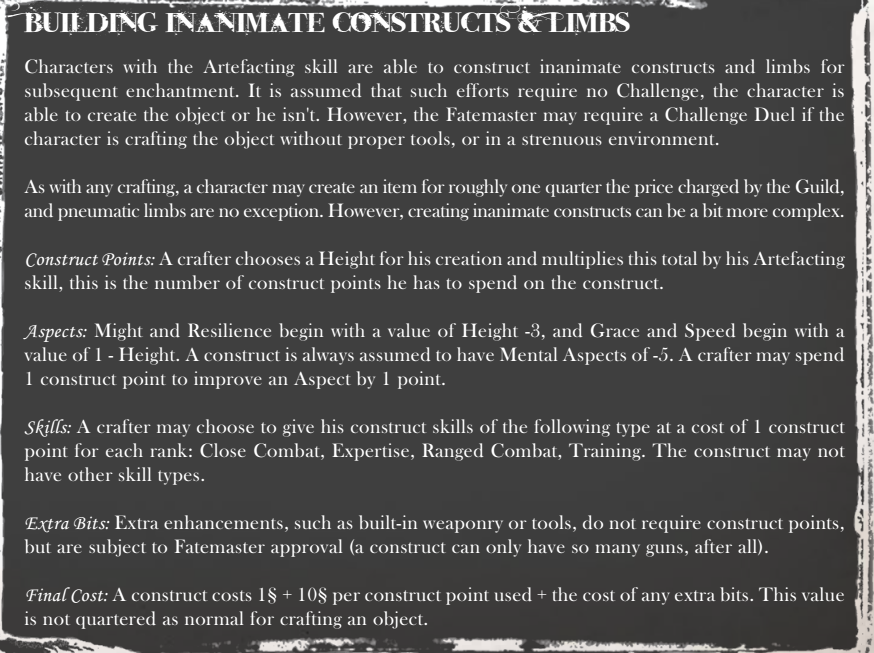
Construct creation is handled here in this sidebar.
Next time: Necromancy, Prestidigitation and Immuto
Post 17
Original SA post Through the Breach: The Fated AlmanacNecromancy is the art of life, death and the mind. It is very potent, if not really socially acceptable.
Beckon runs on Charm, is AP 2 and TN 10 Masks, resisted by Willpower. It lures someone near you, forcing them to move their Walk directly towards you and end the movement as close to you as possible.
Bury runs on Tenacity, is AP 1 and TN 10 Crows, resisted by Willpower. It traps a target outside reality, in a timeless bubble. They return to reality at the end of your turn, appearing safely within 1 yard of you, without sensing any time has passed.
Cadaver Mask runs on Charm, is AP 2 and TN 10 Masks. You remove the face of a corpse, taking on the corpse's appearance voice from life. You get two bonuses to all attempts to impersonate the person, and it lasts until the next sunrise or sunset.
Interrogate runs on Tenacity, is AP 1 and TN 12 Masks, resisted by Willpower. It only works on the living. You may telepathically ask a single yes-or-no question of the target, plus an additional question for each Margin of Success. You will get a truthful answer of yes, no, or I don't know from the target, to the best of their ability.
Mind Control runs on Charm, is AP 1 and TN 10 Masks, resisted by Willpower. You take momentary control of the target's mind and body, forcing them to take a 1 AP Action they could normally take. You may not force the target to sacrifice themself directly, but can make them act against their nature, such as by attacking their friends. You cannot mind control yourself.
Raise Undead runs on Charm, is AP 1 and TN 5 Crows. It works on corpses. The corpse becomes an undead that is under your control for 10 minutes. Its Tenacity becomes 3 and all Mental Aspects become -5. It loses the Living characteristic, if it had it, and gains the Undead characteristic. It loses any mental skills it had in life and halves all physical skill ratings, rounding up. You may also use this spell to take control of an uncontrolled and non-sentient undead creature for ten minutes. The new undead created by this spell may need repairs, but otherwise rise with half of their Wounds remaining. At the end of the spell, the undead becomes uncontrolled and usually violent.
Subsume Corpse runs on Tenacity, is AP 1 and TN 5 Crows. It works on corpses. The corpse is disintegrated utterly, and you heal 1/2/3 damage, plus an additional number of Wounds equal to the corpse's Resilience, if that was positive.
Terrifying Aura runs on Tenacity, is AP 1 and TN 12 Masks, resisted by Willpower. The target gains a potent terrifying aura for one minute. If a Living character ends movement within 1 yard of the target or attacks them, they must pass a TN 10 Horror Duel.
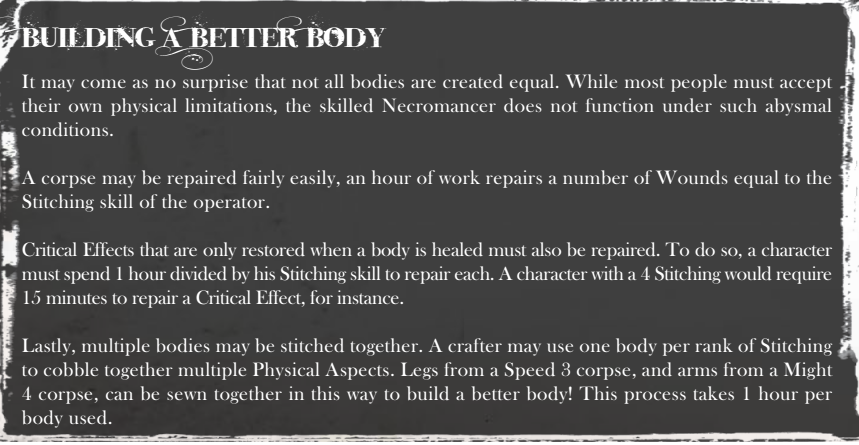
Rules for making better zombies.
Prestidigitation is the magic of illusion, space and location.
Divination runs on Cunning, is AP 2 and TN 10 Tomes. You enter a trance, throwing your senses to any location within a hundred yards. Your body goes limp and you can see and hear as if you stood at the target location, which must obey all normal spell targeting restrictions. The effect lasts an hour or until you will it to end. You can take no actions while in a divination trance.
Teleport runs on Intellect, is AP 1 and TN 10 Tomes, resisted by Willpower if someone chooses to resist. You send one target, which can be yourself or an object, anywhere safe within 30 yards. If an object is in someone's possession, they can resist the spell.
Conjuring runs on Cunning, is AP 2 and TN 10 Tomes. You summon an object previously prepared for summoning. It appears in your hands and must be something you can hold in both hands. Preparing an object is easy - you just touch it and mentally concentrate. You can have up to (Cunning) objects prepared, minimum 1. The object must be in a range of (Cunning) miles.
Invisibility runs on Cunning, is AP 2 and TN 7 Tomes. You touych someone, they become invisible for one round - and you can target yourself. This ends if they interacty with the world in a meaningful way, like by attacking, moving something or opening a door. Any attempts to spot them have 3 penalties if they rely on sight, as must attempts do. You can sitll be registered by other senses, but not magical sight-based senses, like seeing spirits. Any attacks made against an invisible character suffer 3 penalties, but if they succeed, the invisibility ends.
Parlor Tricks runs on Intellect, is AP 1 and TN 5 Masks. You can choose from the following list of effects, but they can never directly harm someone and if they are ever resisted they automatically fail. You can instantly clean and repair the target's clothes. You can make a short and simple sound, like a bell or a single word, audible to the entire room. You can whisper a short sentence that can only be heard by one person you can see. You can make a light object like a key dance around on a small area, like a tabletop. You can change the flavor of a food or drink. You can light a candle, lantern or other device meant to be lit that you can see. You can make a still and translucent image everyone in the room can see. You can summon a small orb of light, about as bright as a lantern, that moves about erratically or hovers near someone. You can open an unlocked door, window or container within sight that could be opened easily with one hand. You can cause soft music audible to the entire room.
Phantasm runs on Intellect, is AP 1 and TN 5 Masks. You create an animated illusion thgat appears real to observers for one minute. You declare all details of it, such as what it will do and what senses it affects, when you create it. It will not react to external stimulus unless directly controlled. The phantasm can be seen, heard or smelled, but not touched or tasted, though it has unharmed by things passing through it. As long as someone has no reason to doubt it, it automatically fools them. If they have reason to disbelieve, they must pass TN 10 Willpower duel to do so. Anyone who touches the illusion automatically disbelieves it. You may directly control the illusion's actions with a 1-AP action, causing it to act as you wish or even change its form within the bounds of the effect. You may banish any illusion you have created at any time without an action.
This brings us to Immuto! Immuto are effects that alter a base Magia, and not all Immuto will work with every Magia if they lack an appropriate effect - good luck adding a Fire Elemental Immuto to a Mind Control spell. When in doubt, the GM is the final arbiter, but creative use of Immuto is encouraged. Immuto also alter the TN of a spell they are applied to, and they come in four types: Augmentation, Alteration, Elemental and Genus.
Alteration Immuto alter the way a spell performs without increasing numeric values.
Alternate Resistance is TN +2, and it swaps whether a spell is resisted by Defense or Willpower.
Blast is TN +2 and may taken up to three times on a spell. It adds a blast to the severe damage effect the first time, to both severe and moderate the second, and two to severe and one to moderate the third time. These are added to whatever normal damage the Magia deals.
Combined Spell is TN +5 and combines the effects of two spells. You pick a second Magia and add its effects ot the spell. The second Magia must have a Base TN lower than or requal to the base TN of the primary Magia. They must be resisted the same way, if resisted. The Primary MAgia may only have Immuto that can apply to both Magia and the Magia must be different.
Delay is special. It causes the spell to be delayed a set time before going off. You take the actions to cast as normal, but nothing happens and no duels are made until the delay condition is met, when the spell resolves without spending any more of your AP. You may also choose to just not make the spell go off at all. For TN +2, you specify a number of turns up to 10 that the spell will be delayed, after which it takes effect. For TN +5, you instead define a situation where the spell will go off, such as a foe walking through a location or the speaking of a key word. Unless this is made permanent by Harness Soulstone, the effect will dissipate, unresolved, at the next sunrise or sunset. Such a situation must be an external event, not something you have control over, and must be something you can't absolutely predict - for example, if you set a spell to cast when a door is opened, it will just dissipate if you open the door yourself or have a friend do it in the knowledge that the spell will go off.
Ignore Caster is TN +2, and ensures that you will never take damage from the spell and are only subject to secondary effects - so, for example, if you hurl a giant fireball blast at your feet, it won't harm you but you may be in trouble if you set the building you're in on fire.
Focus Object reduces a spell's TN by requiring you to be holding or touching the focus object. The reduction is based on how portable and common the object is. Portability gives -0 TN for something you could fit in a small pocket, like a coin, -1 TN for something that would need a pouch or holster and can be held in one hand, like a gun or wand, -2 TN for something needing two hands, like a staff or rifle, and -3 TN for something effectively immobile, such as an engraved summoning circle or cauldron. Commonality gives -0 TN for something extremely common and worth less than 10 scrip, like a rope or pistol, -1 TN for something reasonably available, like a specific make or model of pistol or a wand carved from oak, -2 TN for something that must be specifically crafted by you, requiring at least 2 hours of work, but still replacable, like a special staff or customized pneumatic limb, and -3 TN for something that is just completely unique and impossible to replace.
Augmentation Immuto enhance a Magia's performance, usually by increasing numbers.
Additional Suit is TN -2, and adds a second required suit to the TN, of the caster's choice.
Alter Range is TN -2 to decrease range per step up a table (going from 'sight' to 'close melee' at the extremes) or +2 TN to increase range up the table. However, a melee Magia can never be made to go beyond Melee range, and a Ranged magia can never be made to go below minimum Ranged range.
Increase AP gives TN -3 per additional AP required to cast. However, you may not use this to make a spell require multiple turns to cast, and you can only use it during Dramatic Time.
Increased Damage gives TN +2 per step up the damage chart, which adds 1/1/1 damage each step.
Increased Duration gives TN +2 per step up the duration chart, which ranges from 1 turn to one year at the extremes. Any part of a spell with a set duration will be increased one step, while spells with a duration that lies between two steps are assumed to sit on the lower of the two steps.
Increased Pulse gives TN +2 each time it's applied, increasing any pulse range in the spell by 1 and the TN top resist the pulse by 1.
Increase Resistance gives TN +2 each time it's applied. Any duel made by characters affected by the spell, such as Horror Duels, has its TN increased by 1.
Increased Severity gives TN +1 each time it's applied and it increases the Severe - and only the Severe - value of any damage done by 1. This can also be used for Magia that do not have a set damage flip, but instead deal a set amount of damage, increasing that by 1 each time, but would be TN +2 each time instead of +1.
PUlse is TN +4, and causes a spell to affect every legal target within a yard of the initial target. If the main target is hit, every other character must pass a TN 10 duel using the same defense as the initial target or also be affected. If they would take damage, it is automatically Weak damage.
Reduce AP is TN +5 each time it is applied and reduces the AP cost of the spell by 1. No spell can go below 0 AP.
[u]Reduce Damage[/i] is TN -1 each time it's applied and it is -1/-1/-1 damage, to a minimum of 0/0/1.
Reduce Resistance is TN -2 each time it's applied, and it makes any resistance duel made by the target, such as Horror Duels, have TN -1.
Reduce Severity is TN -3. If a spell deals set damage instead of a damage flip, the spell now deals no damage, but all other effects remain the same, and targets that would suffer effects only if they suffered damage still suffer the effects of the Magia.
Selective Targeting is TN +4, and causes the spell to have no effect on anyone you do not wish to target.
Elemental Immuto add elemental effects to some spells. Normally, a spell may only have one Elemental Immuto placed on it.
Darkness is TN +4, and anyone suffering damage from a Darkness spell also gains the Blind condition for one turn. You may apply this multiple times, and each time increases the Blind duration by 1 turn.
Decay is TN +1. Any undead creature that would suffer damage from a Decay spell instead takes no damage and heals 1 damage instead. You may apply this multiple times, and each time increases the amount of damage undead heal by 1.
Electric is TN +3. Damage dealt by Electric spells ignores armor, and any Electric spell attack does not randomly determine a target when firing into melee.
Fire is TN +2. Any character that suffers damage from a Fire Spell also gains the Burning +1 condition. This can be taken multiple times, and each time increases the value of the Burning condition by 1.
Ice is TN +3. Any character that suffers damage from an Ice Spell gains the Slow condition. This can be taken up to twice, and if it is, the target is Paralyzed instead of Slow.
Natural is TN +2. Any character that suffers damage from a Natural spell gains the Rooted condition.
Rooted : This character can't take Walk or Charge actions. If they are pushed, remove Rooted and they suffer 3 damage.
Poison is TN +1. Any character that suffers damage from a Poison spell gains the Poison +1 condition. This may be taken multiple times, and each time it increases the value of the Poison by 1.
Spirit is TN +4. Spirit spells ignore armor and the Hard to Wound ability.
Terror is TN +1. Any character that suffers damage from a Terror spell must make a TN 6 Horror Duel. This may be taken multiple times, and each time it increases the TN of the Horror Duel by 1.
Genus Immuto either add legal targets to a spell or remove legal targets from it. The former is called Unleashing, the latter Chaining. A spell can only have one Genius Immuto applied to it. When a spell is Unleashed to include a Genus Immuto, the TN of the Immuto is added to the spell's TN. When Chained to app ly only to Genus Immuto, the TN is lowered by that value. Unleashing requires the GM's consent because sometimes it will result in spells that make no fucking sense and cannot be creatively rationalized. If a spell is already limited to a specific target type, it can't be Chained to that target unless it can affect other targets, too.
Beast is TN 2, and affects targets with the Beast characteristic.
Construct is TN 2, and affects targets with the Construct characteristic.
Living is TN 1, and affects targets with the Living characteristic.
Location is TN 3 and affects a location within range. Any targets in the location that could normally resist the spell are assumed to automatically succeed in their Resistance duel.
Inanimate is TN 3 and affects only objects that can't move on their own volition.
Spirits is TN 2 and affects targets with the Spirit characteristic.
Undead is TN 2 and affects targets with the Undead characteristic.
Finally, we come to counter-spelling. Any character with the Counter-Spelling skill can sense when magic is in use or being used within (Tenacity) yards of them. They just know it's in use, though, and must succeed in a TN 10 Tenacity + Counter-Spelling duel to pinpoint the source. The TN goes up by 3 for each magical effect in the area, and you only know the location 1 magical effect per margin of success, starting fro mthe closest and moving outward.
A character is always able to substitute Counter-Spelling for Evade or Centering when determining Defense or Willpower respectively against spell actions. In addition, you can use your skills to shield allies in the same way, substituting your Counter-Spelling for their Evade or Centering against spells. However, while you do this you cannot protect yourself - you can only shield one target at a time, including yourself. Protecting a character with Magical Shielding is a 1-AP action to make the transference, and works as long as you can see the person you're protecting.
You may also use Counter-Spelling to end a spell before its duration would normally expire. This won't work against instant effects, like Elemental Projectile, but will work on anything that lasts a full round or more. Disenchanting an effect is a 0-AP action as long as you are aware of the effect. You make a Counter-Spelling + Tenacity challenge with a TN equal to the spell's TN. If successful, you reduce the duration one step along the duration table per margin of success. If that reduces it to below one turn, it is dispelled entirely. If a spell is kept going by a soulstone, it will automatically recast the spell if dispelled, and will do so with its original duration.
The End!
Next up, the Fatemaster's Guide!